#Moral of the story is that you can avoid your tragic ending if- 1)you remember and accept trans people exist and 2) dont be xenophobic
Text
i finally finished High Noon Over Camelot. I am...........unwell
#Trans rights and trans wrongs and poly rights and poly wrongs but at what cost#Moral of the story is that you can avoid your tragic ending if- 1)you remember and accept trans people exist and 2) dont be xenophobic#But it really gets me that The Mechs like supported Mordred in him wanting peace#They were at his side! Even if Gawain and Arthur believed him to be weak the narrative was on his side#And the tragedy was that he lost faith in his ideals because of the cruelties of his world#Also why are so many people are like 'haha tragedy could have been averted if Galahad hadnt sit on ppl killing chair'#When like the only reason they all had a fighting chance for a happy ending was because of him#And the sacrifices he made because he genuinely wanted everyone to survive. Both by sitting on ppl killing chair and by sacrificing himself#(Even if it was all for naught)#justiceformyman. So what if he is so intense he comes across as every single stereotypical corrupt crazed priest/cult leader#Anyway my favourite songs were Hellfire and Skin and Bone#high noon over camelot#the mechanisms#galahad hnoc#arthur hnoc#guinevere hnoc#lancelot hnoc#hnoc#mordred hnoc#gawain hnoc#drumbot brian#special shoutout to him. He was trying his best#empty thoughts
24 notes
·
View notes
Text
Enemies/Rivals to Lovers recipe
(with the mild version aka Pride and Prejudice and the tragic version aka Romeo and Juliet)
Step 1: The main heroes are on the opposite sides of any scale (the grumpy one vs a cheerful one, a kind and stupid one vs a cunning and vile one, a demon vs a god, a master vs a servant, people of enemy states or absolutely different cultures etc.).
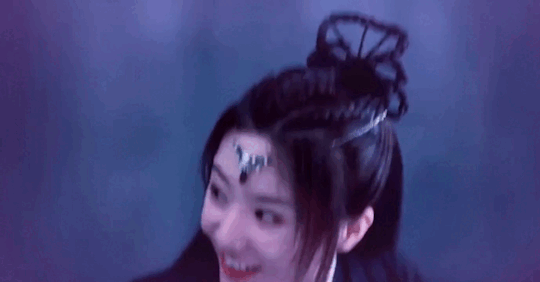
A cheerful and funny little bird demon-yao Qing Qing and a grumpy and stone-faced deity of Netherworld Xue Qianxun
Step 2: They are forced to communicate with each other without a chance to avoid it (e.g. an arranged marriage, being trapped somewhere together, working as a mole in the enemy camp etc.).
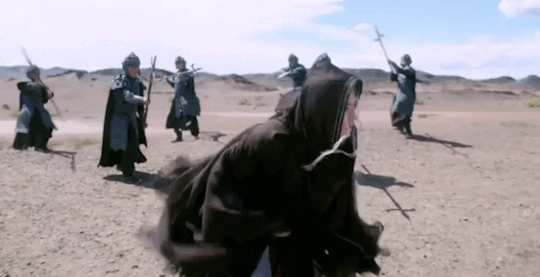


Asura King Xuan Ye plays out damsel in distress to get undercover into Heavenly Realm and his future lover Ran Qing is the one who "rescues" him.
Step 3: One party get impressed by unique character features of other (e.g. the person is the only one who isn't terrified by other's scary reputation, the only one who treats other party well etc.).


Even kings and princes are in absolute terror seeing Gwi - an immortal all-powerful vampire, and only Hye Ryung hates him so much that dares to bicker, scold and deny him.
Step 4: One of the parties takes the first step towards another and that melts another`s heart.
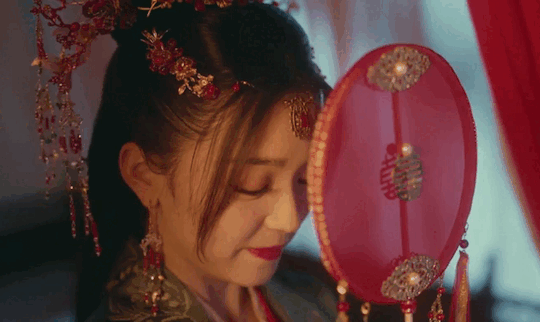
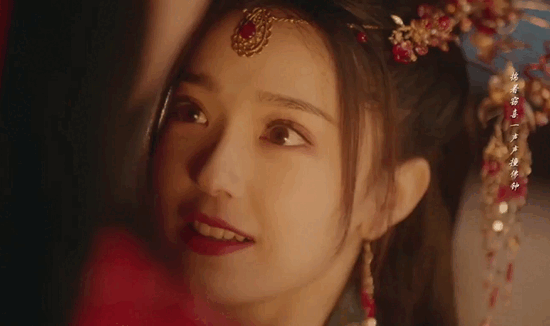
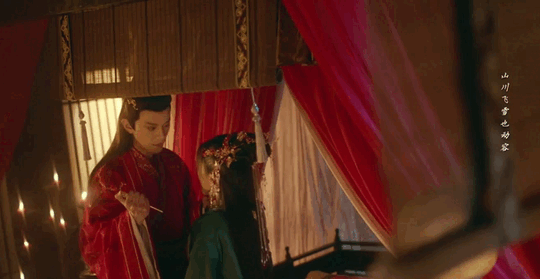
Even if Hou Ling Changjin hurt Princess Bao Zhu for her miraculous blood, she still cares for him and doesn`t hold a grudge.

"You are injured!"

Step 5: Here come mutual pining, UST and moral sufferings "what is more important: to fulfil the mission / to be accepted by the society / whatsoever or to love?"
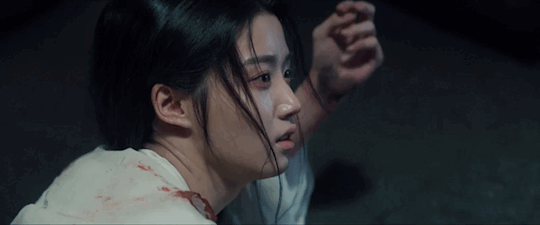
Gong Shangjue doubts if he can indulge himself being gentle with the girl he likes if she is an assassin from the enemy clan.

Shangguan Qian adds Shangjue`s favorite flowers into her tea and thinks about her mission of taking him down.
Step 6: It`s time to confess the feelings.
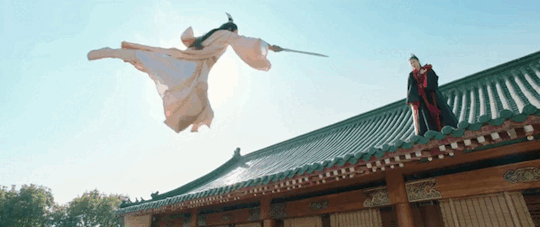
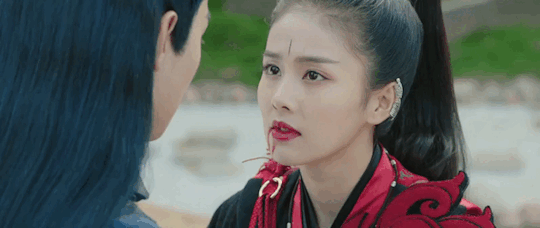
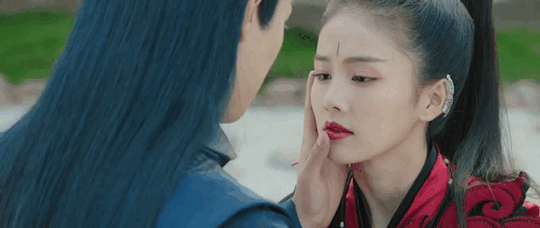
Leader of a diabolic sect Li Chenlan comes to save his beloved who hated him and tried to kill him and promises her to be her sword and shield. So romantic!
Step 7: The parties try to solve the problem that keeps them apart. If the problem is internal (it has something to do with beliefs and prejudice of a person), here it will be solved and «happily ever after» begins.
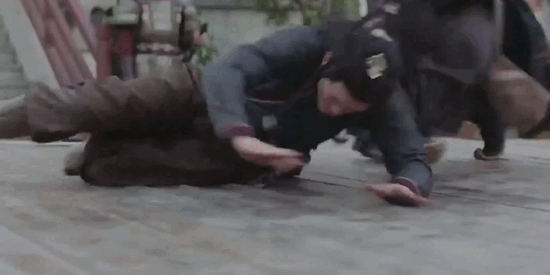
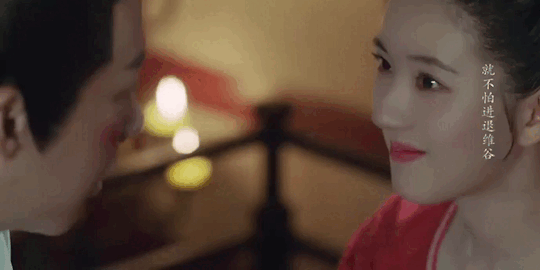
Despite of his low social status Hao Du ventures to participate in the competition, wins the right to marry the princess (who he is in love with) and dares to be honest explaining that he did it not only in order to save her from a Barbarian prince but because he truly wants to be with her.
Step 8: If the problem is external (there is a large-scale conflict and the parties are just some insignificant participants of it), one of the parties sacrifices themselves to solve the problem.


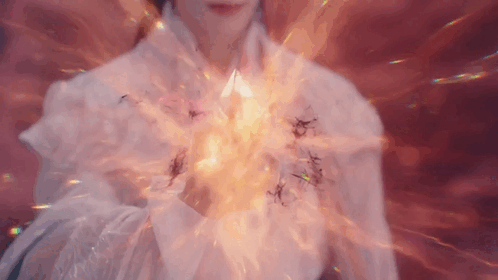
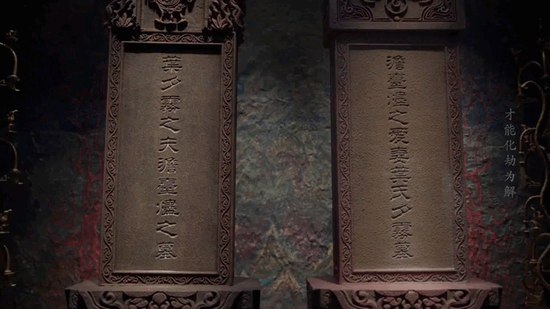
Before saving the world by the cost of his life Demon God Tantai Jin engraves his name on his own tombstone placed next to his beloved wife's one, so in the future she could mourn him in a suitable place.
Step 9: In a satisfying story there is a magical reward of party's brave deed, which is a happy end.

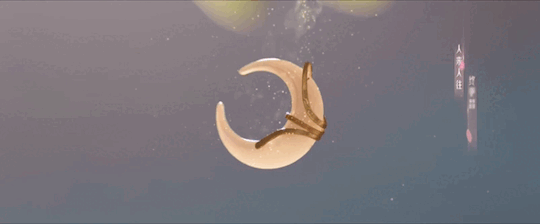
Demon Lord Dongfang Qingcang sacrificed himself in order to save the girl he loved and died but his girlfriend (who happens to be a Goddess with abilities to resurrect the dead) nurtured a piece of his primordial spirit for 500 years and brought him back to life.
Side note: If you want to add some chili pepper into your story, you can break this scheme any step from Step 4 on: pining could be one-sided, UST could never ever be resolved, characters could prefer their goals to love or maybe death or other circumstances would do them apart against their will.
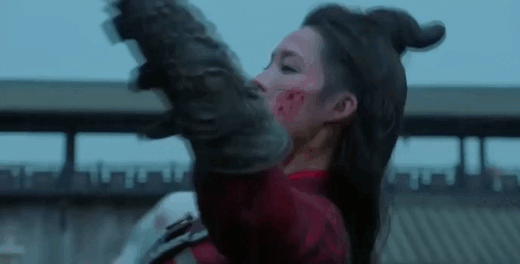
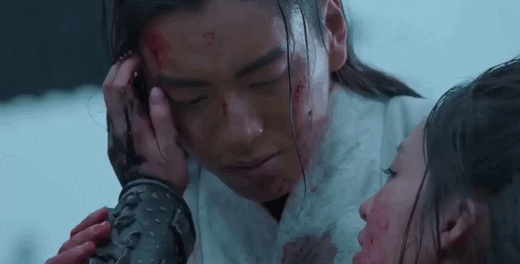
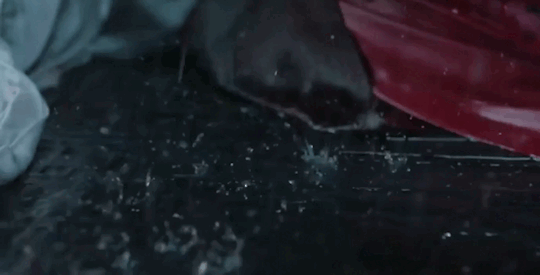
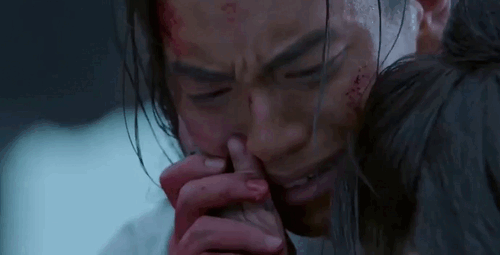
The Wolf and Ma Zhaixing finally got together but the cruel world couldn`t allow it to last anytime long.
Bon Appétit! Your Enemies to Lovers story is well-baked!
#enemies to lovers#rivals to lovers#cdrama#miss the dragon#immortal samsara#chinese drama#scholar who walks the night#butterflied lover#my journey to you#the legends#the long ballad#till the end of the moon#love between fairy and devil#his royal highness wolf#the wolf cdrama#SDabouttropes
56 notes
·
View notes
Note
on your penelope reaction post: i think you’re forgetting that odysseus doesn’t only slaughter the suitors, he hangs all penelope’s maids who supposedly slept with the suitors. i find it hard to believe penelope wouldn’t care about their deaths
The maid's death definitely complicate matters, and it's why I mentioned it as part of option 2 - "Penelope is angry." I can certainly see a reading in which this is a betrayal, as her maids were her only company outside of Telemachus. (Margaret Atwood's Penelopiad is an interpretation that puts the maids at the forefront.)
So the killing of the maids has big implications for all three possible reactions from Penelope:
#1 - if she doesn't care. This has the same problem as her reaction to the suitors. If she doesn't care, she has no agency, and the brutality of it all is glossed over.
#2 - if she is angry. If you're focusing on the maids in this instance, it introduces a pretty major theme into the text, the treatment of women. The women in this story are typically powerful. Circe is a witch, the sirens cannot be defeated - only avoided, Scylla is a monster Odysseus pointedly is not able to kill, Calypso holds him captive for years, and Nausicaä is instrumental in him receiving aid. Penelope is Queen, but has the least agency on her own in this regard. She's forced to put up with men stealing her home, and then her own husband killing her friends.
It's also notable the WAY the girls die. They are hanged. In Greek myth, using Natalie Haynes' lecture linked here as a source, hangings are traditionally the suicide method of virgins. It is associated with them every time. So this is how one could make the argument that the text, Homer himself, supports the innocence of the maids. They are treated as tragic virgins. This is explained in this post here, but the slave girls are always called γυναῖκες, women. But this is likely because - as the post says - ancient Greek as a language would have considered them grown women regardless of age because they are not virgins. This is one of the ways the language traps us, but the hanging gives them (this is going to sound twisted in a modern context but stick with me the story is old) dignity in virginity. Their image is associated with innocence. So you could make the argument that Homer is QUITE implying that these deaths are unjust. Bringing us to
#3 - if she is glad they're dead. I hate to repeat a point, but the main consequence of this one is that Penelope is now implicated in the crime. If you are looking for an ending to the Odyssey with Odysseus and Penelope as a morally grey murder-couple, this is the one. She no longer cares about these women, those men, or their families; she wants her kingdom back. Although it is brutal, I actually don't think this makes Penelope a "bad" character. Odysseus is called πολυτροπος, or, complicated, in some translations. And many of Penelope's epithets mirror his. If we uncritically see her acceptance of him and what he's done, we have to acknowledge that she isn't the pinnacle of virtue that artwork sees her as, patiently waiting. She potentially wanted her palace back more than she wanted those girls to live.
This is why you, the reader, also have options. The poem is millennia old, so we get to play with how we see these characters. So you decide what type of woman and what type of queen Penelope is; I'm sure Homer won't mind.
#sorry I answered your comment with an essay I'll be cool I promise#tagamemnon#the odyssey#odysseus#penelope#Homer
57 notes
·
View notes
Text
I wonder, what kind of ending Link Click is going to have?
On the one hand, there is a possibility for sad ending. From season 1 we hear over and over the same mantra: you can't change the past. It's very dangerous for the whole universe, so you must accept what happened and move on. Also, there are hints that everything is already predetermined by fate, and noone can change it. So, why is Lu Guang going to be an exception and why Cheng Xiaoshi will be allowed to live? It's possible that the moral of whole story is: you have to accept that even the closest people in your life die, and you have to move forward. Still, it's hard to imagine that Lu Guang will live happily without Cheng Xiaoshi, even if the finale shows us that he will move on.
On the other hand, if we look at the anime series about time-travel, most (if not all) of them have a different idea: you can change the past. Fight the tragic destiny, and everything will be fine. You don't have to accept the "inevitable" tragedy, instead, if you fight for happy future (with friends by your side), all deaths will be avoided. So, maybe Link Click wil have the same conclusion? Also, Cheng Xiaoshi had so much character development, moreover, he found friends who love him. The whole meaning of the show is friendship between the main trio, so I don't see the point in separating them. Yeah, of course, in real life this happens, and you can't bring people back from the dead, but I don't think that's how THIS show is supposed to end. So, maybe, Lu Guang will have to ask for help from Cheng Xiaoshi, and that's the point of the show? That you don't have to deal with everything alone, or something like that? And in the end Cheng Xiaoshi and Lu Guang will stay alive together?
And here comes the third option: bittersweet ending, which is more likely possible. If you think about it, every clients' story ends on a bittersweet note: sad events happened, time had passed, but in the end there's some happiness. So, what if Cheng Xiaoshi stays alive, but he will not be allowed to befriend Lu Guang? And Lu Guang, knowing this, will stay out of the way, so the tragic events won't happen? Or maybe Lu Guang will sacrifice himself for Cheng Xiaoshi's life, but the latter won't even know it, because he'll, I don't know, lose memories about Lu Guang. However, again, this donghua shows us the importance of friendship, so, in my opinion, it would be very cruel and hypocritical to separate the main characters.
38 notes
·
View notes
Text
Crafting Authentic Slavic Characters: A Guide to Avoid Stereotypes and Embrace Diversity
A/N: I've been informed that people who have nothing on their blog can be mistaken for bots, so I decided to make one about something I'm really passionate about, as a Montenegrin woman. So sit back and enjoy :) (Keep in mind that I've never written a blog before, not even in my native language, so excuse any mistakes.)
Dear writers and storytellers,
As we dive into the art of character creation, it's essential to recognize the significance of crafting Slavic characters authentically and respectfully. Our stories have the power to challenge stereotypes and foster cultural understanding. This guide aims to provide a balanced perspective on what to do and what not to do when developing Slavic characters.
1. Do Research Thoroughly: Invest time in researching Slavic cultures, languages, history, and traditions. The more you know, the better you can authentically represent Slavic characters.
2. Don't Rely on Stereotypes: Avoid portraying Slavic characters solely through stereotypes like the "Russian villain" or "stoic Eastern European." Break away from these clichés.
3. Do Embrace Diversity: Recognize the diversity within the Slavic region. Slavic culture varies greatly from one country to another, so consider this when creating characters.
4. Don't Use Accents as a Crutch: Avoid heavy phonetic accents in dialogue, as they can come across as caricatures. Instead, convey their origin through subtle language choices.
5. Do Develop Complex Personalities: Slavic characters, like any others, should have multi-dimensional personalities, aspirations, and flaws. Make them relatable.
6. Don't Overdo "Tragic Backstories": While adversity can make a character compelling, avoid making every Slavic character's life a never-ending tragedy.
7. Do Consult Sensitively: If you're not from a Slavic background, consider seeking input from individuals who are. Be respectful and willing to learn.
8. Don't Fetishize Culture: Avoid reducing Slavic culture to exotic or mystical elements. Portray it respectfully, not as a novelty.
9. Do Challenge Prejudices: Use your writing to challenge stereotypes and prejudices, both within your story and in your readers' minds.
10. Don't Make All Slavic Characters the Same: Not every Slavic character should conform to a specific mold. Showcase their individuality.
11. Do Address Historical Context: If your story involves historical events or themes, handle them with sensitivity and accuracy.
12. Don't Neglect Positive Representations: While conflict can be a central theme, don't forget to include positive Slavic characters who contribute to the narrative in meaningful ways.
13. Do Avoid Cultural Appropriation: Use cultural elements respectfully and with proper context, avoiding appropriation or misrepresentation.
14. Don't Make Language Mistakes: If using Slavic languages in your writing, ensure they are used correctly to avoid unintended errors or offense.
15. Do Humanize Your Characters: At the core of it all, Slavic characters are human beings. Treat them with the same care, depth, and humanity you would any other character.
16. Don't Be Complacent: Writing authentic Slavic characters is an ongoing process. Continuously educate yourself and be open to feedback.
In conclusion, dear writers, crafting Slavic characters that break free from stereotypes and embrace diversity is not just a creative endeavor but a moral one. As storytellers, we have the power to shape perceptions and promote cultural understanding. By following these guidelines and committing to respectful and nuanced representation, we can contribute to a more inclusive and vibrant literary landscape.
Let's embark on this journey together, armed with knowledge and empathy, and create characters that truly reflect the rich tapestry of the Slavic experience.
You're also free to ask *me* any questions, if you have them and would like an answer from someone who's actually Slavic.
With sincerity and resolve,
Nyushka, a certified Slavic person :)
#writeblr#writerscommunity#ao3 writer#writer things#writblr#writerslife#representation matters#culture#slavic#slavic culture#slavic representation#inclusion#inclusivity#representation#representation in media#representation in literature#culturalexploration#culturalheritage#cultural differences#cultural diversity#diversity#diversity in media
24 notes
·
View notes
Text
Ranking the families of Arda
Disclaimer: Since there is so much overlap between many of these prominent families I will try to go by the paternal lines, as that usually determines who your counted among with a notable exception being the descendants of Luthien.
Second disclaimer: I won't be including the House of Finwe but rather count his sons's families separately because it makes it easier and because I don't like him.
1. House of Feanor
Take one scroll through my page and you'll immediately know I'm a Feanorian kinnie.
Maglor, Maedhros, and Caranthir are my favorites but I love all these horrible men and will wholeheartedly defend them but C&C might be exceptions.
Still love Celegorm as a character though given how interesting he is. He has the background of a Disney princess since he can talk to animals and had somewhat of fairy godfather yet his fall from grace is down a deeper darker hole than all his brothers and maybe even his father.
2. Mirkwood Royals
Starting off, Oropher himself is rather interesting. Little of his life as a noble in Doriath but after it's fall is where his story truly seems to start.
Now, I have to admit that as someone who descends from colonized people, I do not support colonization in the slightest but Oropher lands on the better end of colonizers. He and his Sindarin people seem to have assimilated into Silvan culture instead of forcing his own upon them. Also, he seems to have been a decent king given he did his best to avoid Sauron but eventually died fighting with the last alliance.
Where to begin with Thranduil. Let me just say he is an iconic character filled with so much charisma and personality. I adore him.
And Legolas, he has a special place in my heart. I loved his vibe from the moment we met him in LoTR. Legolas also proved to me that you don't need to have a tragic backstory(Shut up hobbit movies, his mom could be alive!) or be morally gray to be an enjoyable character.
3. Baggins Family
I love Bilbo. I love Frodo.
I have nothing more to say.
4. House of Finarfin
Finarfin himself, I first underestimated as a character. In comparison to his influential and powerful elder brothers, he seemed so dull. However, the more I read into him, the more appreciation I gained for his character. I also respect that Finarfin seemed to assimilate into his wife's culture and it wasn't only the other way around.
Now, his and Earwen's descendants. I love them all.
5. House of Elros
I suppose all of them are technically members of the House of Fingolfin but since they're humans, I will count them separately.
This family has so many members and not all of them were written about but the ones that were fleshed out were super cool. Elros himself is super interesting given he chose mortality despite everyone he knew and loved at that point was immortal. Vardamir, Elros's son and successor was a cool scholarly dude, Aldarion was literally human Earendil and knew all the cool elf dudes and knew about the threat of Sauron, his daughter Ancalime was an influential badass queen, and finally, Pharazon was a pretty good villain as far as villains go.
5.5. Feanturi + Nienna
I don't know if they should be allowed on this list but I love everything about these three Valar siblings.
6. House of Beor
I care about three characters from the House of Beor and their names are Andreth, Morwen, and Erendis.
I guess I really love long suffering women huh. In all seriousness, I actually think these characters are super interesting and in some cases relatable.
I don't care for the guys though. Before you attack me, let me say I don't hate Beren and think he's a pretty good dude but I just never really connected to his character.
7. House of Fingolfin
Fingon and Aredhel own my heart, I think they're amazing characters. Also, they're both fashion icons.
I love Earendil and his twin boys.
Turgon is an interesting character although he's not one of my faves. Idril's cool I guess.
Maeglin sucks.
8. House of Haleth
I love Haleth and Hurin, and I think Turin is an interesting character.
Everyone else, I don't have an opinion on.
9. Telerin Royal Family
I wholeheartedly love two, maybe four characters from this family. Cirdan, Elwing, Elrond, and Elros.
The twins are already spoken for so let me discuss their mom. Despite being a Feanorian sympathizer, I cannot help but love Elwing. She's an incredibly complex character and I love that about her. I know the fandom characterizes Elwing and Earendil as codependant and while that's probably true to some degree, it doesn't give Elwing enough credit. She didn't sacrifice a possibility of eternal happiness with her elven family for Earendil and she ruled over the Havens of Sirion quite possibly alone while Earendil was off doing hero business.
Cirdan is another awesome underrated character imo. His selflessness is inspiring.
I also want to say I like Celeborn and for some reason I have a soft spot for Olwe but I don't care that much about them, sorry.
Characters from this family I truly don't like Thingol and Dior, and everyone else isn't fleshed out enough for me to have an opinion on.
10. House of Durin
And I finally get to talk about some Dwarves!
I liked Thorin. He made the Hobbit fun and interesting.
I loved Gimli! He's a boss and totally deserved to go to Valinor with his bff.
11. Stewards of Gondor
Boromir and Faramir are awesome.
12. House of Eorl
I love Eowyn with my entire heart. Eomer pretty cool too.
13. Vanyarin Royal Family
Ingwe is low key boring, I'm sorry.
Ingwion is there I guess and close to Finarfin presumably given he fought in the war of wrath.
I like Indis but I don't love her. If her descendants were included this fam would be a lot higher.
#lotr#the lord of the rings#the silmarillion#jrr tolkien#feanor#feanorians#maglor#maedhros#fingolfin#finweans#elros#elrond#galadriel#thranduil#legolas#gimli#thorin oakenshield#boromir#faramir#eowyn#bilbo baggins#frodo baggins
49 notes
·
View notes
Text
so, you’ve heard about the mechanisms, but have no idea what they are or how to get into them?
the mechanisms are a steampunk folk concept band! if you’re familiar with the decemberists, some of the stuff david bowie has done, or steam powered giraffe, it’s a bit like that- each album tells a story! (the albums are all tragic space operas, with the added bonus of being very queer!)
the bit where it starts to get complicated is the band itself. they’re all playing characters, and they do their shows in character! so, basically, the narration on the albums isn’t omniscient- it’s being narrated by the mechanisms, who have opinions about the story and tend to get involved in it at some point. to differentiate them from the actual band, i’m going to refer to them as ‘the crew of the aurora’!
further details under the cut! (edit: added some links!)
the albums
they have 4 main albums, which you can listen to on spotify, bandcamp and youtube! just look them up, there's a youtube account called TheVoidSings that does lyric videos + album playlists, as well as the mechanisms official account! in addition, they are all linked at the end of this post.
(note: the albums are all tragedies, and there’s some pretty intense stuff that can happen- i wouldn’t let that steer you away from it as they are very good and well done, but if you tend to like lighter or happier stories, be a bit careful going in? a lot of queer characters tend to die- because 1. everyone dies and 2. everyone is queer- which, while it’s not bury your gays, i know some people like to avoid.)
album descriptions
-once upon a time (in space)- based on european fairy tales! stars snow white and her attempt to rebel against the evil king cole and his intergalactic empire and rescue her sister, rose red! also has a lesbian romance at the center!
-ulysses dies at dawn- based on greek mythology! stars four 'suitors'- orpheus, oedipus, ariadne, and hercules- trying to break into ulysses/odysseus' secret vault on a job for the olympians, an elite mob family with a stranglehold over the planet it takes place on
-high noon over camelot- a steampunk western based on arthurian legend! features poly arthur, guinevere, and lancelot on a quest for the G.R.A.I.L, the control center of the abandoned space station they're trapped on
-the bifrost incident- based on norse mythology! a locked room mystery around what happened to the ratatosk express, a train that disappeared eighty years ago with all of the asgardian ruling class on board. this album is also rock, versus the earlier ones which were folkpunk.
you can listen to them in any order (i've summarized them in order of release), but you should listen to the album of your choice in order/all the way through! (my personal favorite is high noon over camelot!)
the crew
the crew of the aurora is a group of nine queer space pirates! they’re all immortal, mostly because of dr carmilla, a morally ambiguous, very lonely lesbian vampire who has a slight problem with experimenting on dying children. they all have a mechanical part of some kind- for example, ashes o’reilly has mechanical lungs, because they originally died from smoke inhalation. that part is called their mechanism, and it’s what’s keeping them immortal! (also, their immortality works by having them come back from death, rather than being unable to be harmed. this can result in them doing really stupid shit, dying, and then just coming back. they murder each other a lot to bond) there’s a lot of found family vibes, which is quite nice! in general, despite being tragic figures themself, they add an air of humor to the albums with their banter and the like!
each of the crew has their own backstory, mostly from quite different genres! if you’d like a fairly comprehensive version of all their backstory songs, i’d recommend this recorded show and if you’d like just an assessment of their general vibes/a good intro to everything, i’d suggest looking up ‘the ignomious demise of dr plitchard’ (one of their stand-alone songs)
bonus content
recorded gigs- there are quite a few out there, and i’d highly recommend listening to them, because the shows were the original way the media was supposed to be! there’s a ton of in character banter, they’re all in costume, all that!
death to the mechanisms- the mechanisms’ last show! it has a very bittersweet vibe, but there’s also incredible lighting, as well as proper recordings of tales to be told and drunk space pirate (the songs they play at the beginning and end of each show!) there’s also a lot of lore there that’s nice to know, including what it says on the tin: how they all, eventually, die. note- there’s a stream and an audio version. the stream is choppy and cuts out a lot, and the audio version is nice and clean, but the stream is still nice to watch because of the lighting and the visual jokes.
tales to be told volumes one and two- compilations of all their standalone songs! some of them fit with albums, and some of them are their own retellings that work on their own! this is also where all the backstory songs are compiled, though i’d recommend watching the recorded show i linked instead as that has the relevant exposition.
frankenstein- a standalone, 10 minute album on youtube about the story of victoria frankenstein and the rogue ai she created.
dr. carmilla albums (exhumed and [un]plugged + ageha prototype edition, available on bandcamp)- songs telling the backstory of doctor carmilla, the mechanisms’ creator! they’re in a different style than the rest- think girl in red. lots of yearning lesbian music vibes.
mechanisms fiction- this is on their website! has a lot of very interesting lore and character things, and i’d highly recommend reading all of it! it’s also very well written. personally, i’d recommend ulysses and narcissus go to the seaside, the quickest draw, archive footage, and bedtime story for the writing, and ever after, the story of the toy soldier, who killed dr carmilla, and ghost in the machine for lore!
resources
links to almost all the mechanisms content out there!
album links
once upon a time in space- spotify/bandcamp/youtube
ulysses dies at dawn- spotify/bandcamp/youtube
high noon over camelot- spotify/bandcamp/youtube
the bifrost incident- spotify/bandcamp/youtube
bonus content
tales to be told, volume 1- spotify/bandcamp/youtube
tales to be told, volume 2- spotify/bandcamp/youtube
frankenstein- spotify/bandcamp/youtube
mechanisms ‘supplementals’ (songs not in the albums, alternative versions, etc)- youtube
exhumed and (un)plugged- bandcamp/youtube
ageha (prototype edition)- bandcamp/youtube
mechanisms fiction
additional short story
tumblr (mostly an inactive blog for the band to post about shows they were doing, but features some in-character posts)
twitter (ditto)
---
gig compilation post
fiction compilation post
blog compilation post
deep lore post
fanfiction recommendations list
#the mechanisms#the mechs#gonna tag this with#because a lot of tma people end up wanting to get into the mechs#the magnus archives#my posts
1K notes
·
View notes
Text
Reading Recs for Each Entity
When Magnus ended, I thought back on different media that I've enjoyed, some of them fit very neatly into the dread powers, unsettlingly so in some cases, others not so much. If you enjoyed the show for it's horror, and want more of that, then I've got a list for you.
Assume everything here is rated M and has some gore, death, and general dark themes.
Beneath the cut, because there's 15 of these fears. Feel free to add on if you like. By the way, I'm citing writers, not directors when there's a movie.
Beholding
1984 - by George Orwell: Classic surveillance society. Very boring to start off with classical lit, but it was and still is a relevant commentary on society.
Psycho-Pass - by Gen Urobuchi: Has anyone read Hobbes' 'Leviathan'? It's like if that met psychological horror. This anime engages in what it means to live in a world where crimes can be stopped before their ever committed due to the Psycho-Pass system. This system allows authorities to monitor ones emotional state and likelihood of turning violent. I think there's a brief mention of sexual violence, but it's been a hot minute since I've watched.
Panopticon Theory - by Michel Foucault: Yes, political theory. I've read it multiple times (not by choice) and it offers some interesting insights into the world of the Magnus Archives. It's greatly influenced how I regard the dread powers, that being that Smirke's 14 is incredibly limiting.
Buried
Nutty Putty Caving Incident - A real life news story. The only time I can say I've felt properly horrified and deeply unsettled. If 'Lost John's Cave' was the statement that gave you nightmares, avoid this. It's true and it's tragic.
Corruption
Fate/Zero - by Gen Urobuchi: Another anime by the Urobutcher. If you thought Jane Prentiss was excellent this is the show for you. It's excellent for all sorts of reasons, and engages with other avenues of horror but when I heard the Prentiss statement, I was brought back here. Living hives, magical evil wasp larvae writhing beneath someone's skin, it happens. Your warning is that anything bad that can happen to a child, will happen to children here. I mean it.
The Picture of Dorian Gray - by Oscar Wilde: Moral decay, and it's just a damn good read. It's not conventional Corruption material, but the corruption of one's soul in the pursuit of beauty and pleasure is somewhat fitting I should think. I like it, so it's here. Also Jonah Magnus vibes.
Dark
Eternal Sunshine of the Spotless Mind - by a bunch of people: it's a movie. Not an orthodox choice but I feel the dark deals better in ignorance then the literal. Err, no spoilers, but nothing particularly bad happens, it just sort of tugs.
The Flowers - Alice Walker: A short story about innocence and ignorance. Not particularly spooky, but it hits you at the end.
Allegory of the Cave - Plato: Just a good preliminary reading that provides an alternate lens. It's not spooky, I just like it.
Desolation
All is Quiet on the Western Front - by Erich Maria Remarque: The effects of war on the youth, child soldiers, and the death of innocence. It's bleak, and miserable, but it's honest and Remarque and his family were persecuted by Nazi-Germany because the book carried 'anti-german' (anti-war) sentiments. There's a movie as well.
Pan's Labyrinth - by Guillermo del Toro: Also anti-war, with bad things happening to good people and children. A bit heavy handed with it's symbolism, but hey it's a two hour movie. Also be prepared to read subtitles. It's very good, and if you haven't seen it, I don't want to say too much.
One Flew Over the Cuckoo's Nest - by Ken Kesey: There's a more popular movie version as well. Corrupt systems, cutting people down until they fit into a socially appropriate mold. It's fairly dark, and has lobotomies since that was what, the 60s? I watched this in my catholic high schools film studies class, so I don't think there's anything overly egregious. But an interesting lens for the Desolation.
The Count of Monte Cristo - by Alexandre Dumas: For a fun revenge romp. The titular count gets his revenge after everything he's ever loved has been stolen from him and looks to do the same to his betrayers. Err sexual violence happens here as well. A bit of background that might inform the reader: Dumas' father was half black and affected by the 1802 discrimination laws, causing him- a high ranking military officer to be dismissed. The precursor to Monte Cristo, 'Georges' deals more heavily in themes of colonialism and racial discrimination.
End
Masque of the Red Death - by Edgar Allen Poe: You know why this is here. Warning for plague allegories and people not properly social distancing.
Nothing in the Dark - (Twilight Zone): No words needed, it's the Twilight Zone.
Death Parade - by Yuzuru Tachikawa: This is your fun suggestion. It's light for the most part, but there are scenes and moments that will absolutely hit you.
Extinction
Godzilla - A whole bunch of people: Atomic bomb fear during a time of censorship. Everything is an allegory.
Flesh
Tokyo Ghoul - by Sui Ishida: It's the most Magnus-y out of all my suggestions and I desperately want to see a crossover between them. The manga is better as the anime tends to brutalise plot points and water down the horror. Deals with becoming a cannibal, the nature of humanity, and other things. Warning for mentions of child abuse. Kaneki has a sort of - if Martin was the Archivist vibes. Not 1-1 of course, but if I had to make a comparison, that's the one.
Lamb to the Slaughter - by Roald Dahl: Arguably more slaughter, but hey I'm not giving you any warnings. I read this short story for ninth grade english, so I'm sure you can survive this one.
Hunt
Se7en - by Andrew Kevin Walker: A movie about a detective hunting serial killer. It's excellent, there's gruesome murder scenes. It's from the 90s go watch it.
Frankenstein - by Mary Shelley: From the perspective of Mr. Frankenstein it's the terror of being hunted, from the monster's perspective it's the horror of being alone. It's good, a pillar of sci-fi written by a teenager, don't snub this because it's classical lit.
The Bone Collector - by Jeremy Iacone: Another detective hunting a murderer. Also from the 90s and also excellent. Look, the 90s don't pull their punches, it's got blood and lots of it. A favourite film of mine.
Lonely
The Metamorphosis - by Franz Kafka: Turning into a big bug does not a corruption/flesh story make.
Passengers (2016)- by Jon Spaihts: I hate this movie, it's clearly a horror, but they try to pass it as a romance. Anyway, for psychological lonely horror and manipulation, this is a movie for you.
Slaughter
Go watch a classic slasher film. I don't care for senseless violence, so I don't like most of this sort of media.
Read up on a war or a riot. Learn how your nation's government discriminates and persecutes minorities historically and today.
Sweeney Todd - by Hugh Wheeler: The musical is the better known version. Some flesh horror here as well. It's not really senseless, as I think the Slaughter should be, but hey, we need substance here.
Spiral
The Giver - by Lois Lowry: A utopia that is not quite right. Read for school when I was nine, I'm sure you can all live without a warning list.
The Matrix - by the Wachowskis: Reality is an illusion, and the Universe is a hologram.
Truman Show - by Andrew Niccol: You know why this is here.
Stranger
Coraline - by Neil Gaiman: The scariest children's book. Other!Mother and all that jazz are so very Strange.
The Landlady - by Roald Dahl: Taxidermy.
Vast
Lovecraft: I'm sorry, I can only think of him. No one else is so ignorant as to be able to capture the horror of things beyond their ken.
Web
Medea - by Euripides: The God's suck, it's a Greek tragedy, bad things happen to everyone without discrimination. Children are harmed, Medea is dosed by Aphrodite, Jason is literally the worst.
Animal Farm - by George Orwell: It's anti-authoritarian and deals with the mutability of laws and how uneducated masses are sheep. . . literally. You will feel horrified, it's a short read.
There's also some children's story about a spider/snake(?) and gluttony that I've been looking for, for the past year. It's pretty similar to Mr. Spider, but the villain consumes so many victims that he becomes too large to leave his den and is blockaded in by those he terrorized, and it's heavily implied that he starves to death. For the life of me I can't remember a title, but then, it's been 15 or so years.
#the magnus archives#tma#the beholding#the buried#the flesh#the corruption#the end#the dark#the vast#the web#the stranger#the lonely#the spiral#the slaughter#the hunt#the desolation#the extinction#tma entities#spooky recs
71 notes
·
View notes
Text
Kunikida + Oda: Death of a Good Man

While Kunikida and Oda have never met in canon they are characters with a lot in common. They both essentially play the same role, as the moral center of their respective groups (particularly acting as a conscience for Dazai). They both share the same strengths and weaknesses. However, one lives and one dies. MORE UNDER THE CUT.
1. Relationship with Dazai
Dazai is a character who has trouble seeing himself as a person. That is, he doesn’t see himself as the same as everyone else. (His ability is titled No Longer Human, surprise, surprise). Oda says as much to Dazai, that traditional values like good or evil don’t really mean that much to him.
“Whether you’re on the side that takes lives, or the side that saves them nothing beyond your own expectations will happen. Nothing in this world can fill the hole that is your loneliness. You will wander for eternity.”
...
“Be on the side that saves people. If both sides are the same, then choose to be a good person.” - Osamu Dazai and the Dark Era
It’s not that Dazai is a sociopath, or even unfeeling, it’s just that he is so distanced from his own humanity, and from other people. He genuinely believes he can’t feel the same way as they do. Dazai even described the way he saw himself to Fyodor.
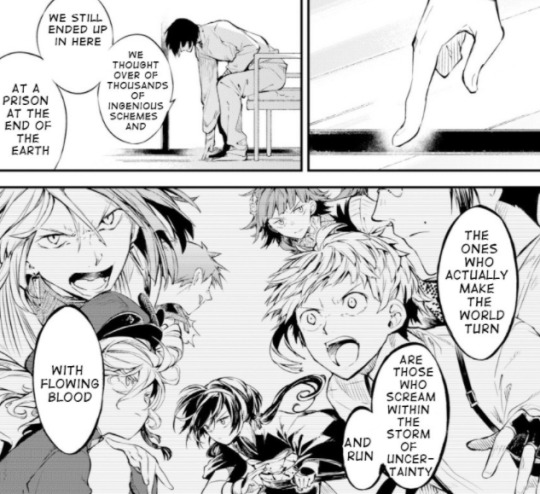
Dazai tells Fyodor that he feels like he’s sperate from everyone else. It’s like he’s the player, and everybody else is pieces on the game board. But, even though he might come up with strategies and move the pieces, he’s not really the one changing things, or affecting other people’s lives because he’s not right there in the middle of things he’s far away.

Dazai even flashes back to Oda and Gide’s final showdown when trying to explain this feeling to Fyodor. Oda his closest and only friend at the time, who he could not reach out to and save. Dazai believes he can’t touch other people, he can’t reach out and save them, because he sees himself as lacking in feelings or a heart. Which is why, Dazai relies on the people around him. Dazai attached himself to Oda when he was in the Mafia, and then again to Kunikida when he was detective agency to essentially act as his heart, his external conscience for him. That’s the relationship he shares with both of them. It’s why the first two light novels are essentially about Dazai, but narrated from the point of view of his partner at the time. Light novel one is about his partnership with Kunikida, and Light Novel 2 is about his friendship with Oda back in the dark age. The connection between them is that both Oda, and Kunikida are good, just men who have tried to understand Dazai in one way or another.
The events of both light novels even mirror each other to an extent. Entrance exam is about Dazai joining the agency, Dark Era is about Dazai leaving the mafia. Entrance exam is about Kunikida failing to understand Dazai, but learning to trust him anyway. Dark Era is about Oda being the only one who fully understands Dazai, but then not listening to him at the end of the story. They both end with a symbolic death, Oda commits double suicide with Gide, whereas Kunikida pretends to shoot Dazai in order to follow his plan.
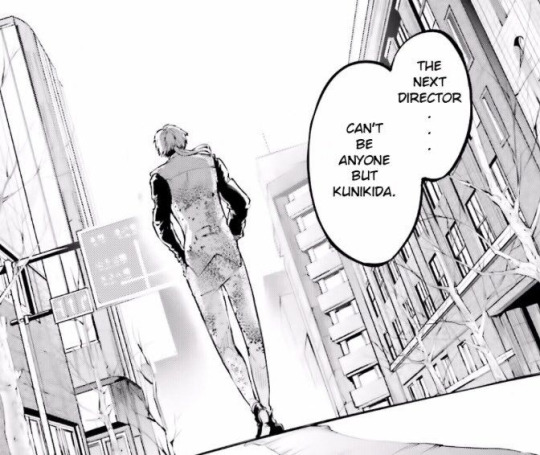
Dazai’s a master strategist, but he’s not a leader of men, nor does he have any particular ideals he stands for. Dazai was given a position of leadership within the port mafia, and not only did he spend the entire time tormenting his closest subordinate but he didn’t care about the lives of his subordinates the way Chuuya does.
Dazai sees Kunikida as someone having the ideals he does not have, therefore doing what he cannot, and being what he cannot be to others. This is a role Oda used to serve as his one and only friend. However, while they occupy the same spot as Dazai’s most trusted person their relationships with him are very different.
Kunikida is very combative with Dazai and always fighting against him. He personally expects Dazai to be better in all aspects. He scolds him for being lazy and neglecting his work. When Dazai messes with other people or manipulates them, it’s Kunikida who is the first to get frustrated with him. Kunikida also, tends to lack a fundamental understanding of Dazai. It’s a running joke that he’s always a step behind him (he’s the last person to find out Dazai was a mafia member when everyone else already knew). The literal first thing established about their relationship in the first chapter, is that they are constantly fighting with each other. They barely make it through a dinner with Atsushi.
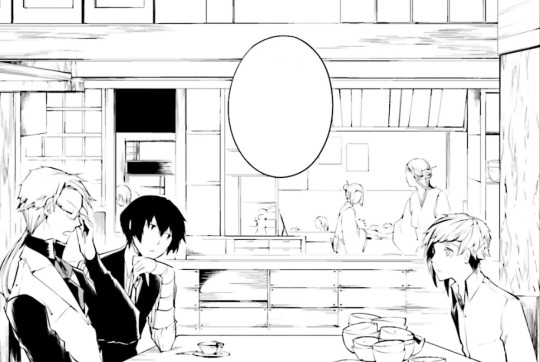
However, Kunikida also listens to Dazai when it’s important. It’s the other way around with Oda, Oda is someone who does fundamentally understand who Dazai really is deep down. However, at the same time Oda doesn’t really try to exert any influence over Dazai until the very end of his life. Their relationship was defined by being distant to one another, and not asking questions.
The reason why Ango and I were able to be by his side was that we understood the solitude that surrounded him, and we never stepped inside it no matter how close we stood.
But in that moment, I kind of regretted not stepping in and invading that solitude.
Dazai Osamu and the Dark Era.
Him, Ango and Dazai could only keep meeting as the Buraiha at the Lupin bar if they pretended to not know anything about what each other did outside of the bar. They’re different in one main aspect, Kunikida fights Dazai, and Oda doesn’t start fighting until it’s almost far too late.
2. Living and Dying for One’s Ideals
One more direct parallel between the two is that Kunikida and Oda are both characters who strive to live up to the ideal they find in a book. Literally. Kunikida obsessively writes out his ideals in his notebook where he has his whole future planned out.
What are ideals? There are innumerable answers to that question. One could say it’s merely a term, or an idea, or perhaps even the soruce of all meaning. But if you ask me, the answer is obvious. It’s the word written on the cover of my notebook.
My notebook has all the answers. It is my creed, my master, and a prophet that guides me. At times, it can either be a weapon ro a solution. Ideals. Everything I am is written in this notebook which I always carry with me. My entire future lies within it - Osamu Dazai’s Entrance Exam
Oda picked up a book and loved it so much he wanted to write the ending for himself.
After worrying about it for so long, I came to one conclusion.
“Then you write what happens next.”
I decided to write about it myself. I would become a novelist, and write a story about why the man stopped killing. But to become a novelist, I needed to sincerely know what it meant to live. So, I stopped killing. -
Osamu Dazai and the Dark Era.
Kunikida and Oda are both characters who find their will to live for the future within the pages of a book. Which makes sense as both characters struggle with lofty ideals and a harsh reality. Oda and Kunikida are characters written about the struggle to be a good man, in a world that is not good. To hold ideals, in a world that is not ideal. This once again ties back to what Dazai said to Fyodor, God isn’t perfect harmony, he’s illogical and absurd.


The world isn’t ideal and orderly. It’s extremely, extremely messy. Kunikida and Oda are both characters who strive to be better, and want the world to be better and because of that they fall into conflict. However, Oda lost his fight, and Kunikida is still fighting. Part of why Dazai got so attached to Kunikida is also because he saw Oda’s ideals within Kunikida, and knew that carrying those ideals could crush him so easily.
“Justice is a weapon. It can be used to harm, but it cannot protect and save others.” -Osamu Dazai’s Entrance Exams
The meanings of Dazai’s words are clear when you look at them in the context of what he learned after losing Oda. Oda decided to throw his life away to avenge the children after Gide. He achieved justice then. However, nobody was saved. The children were already dead. Oda himself wasn’t saved. Dazai lost his only friend.
“Something?” I looked at Dazai. “There isn’t anything, Dazai. It’s all over. Everything. Whatever else happens now is meaningless - just like I’m about to do. AM I wrong?”
“Odasaku...” Dazai said softly. “Forgive me for the absurd wording but - don’t go. Find something to rely on. Expect good things to happen from here on out. There’s gotta be soemthing...”
[...]
Oda’s march against Gide isn’t just tragic, it’s a deliberate choice. It was a suiide. He’s given several oppurtunities to just walk away, or wait for something else to give him a reason to live and he doesn’t. His final actions hurt more than they helped. Yes, he did save Dazai in a way by throwing his life away, but Dazai also lost the person who could understand him. Oda could have lived. He could have done more if he had lived. Dazai even says so in dead apple, saving people is the more beautiful path, but you have to be alive to see that beauty.

This is also why Kunikida and Oda have such a connection to Dazai. Underneath their struggles to be a good man they are both constantly dealing with suicidal feelings.
Kunikida is far more fragile than he lets on. Part of the reason he attaches himself to ideals rather than people, is because caring about people hurts, and he is so afraid of failing the people in his life (the same way Oda eventually failed to protect the children) that he can’t admit the depth to which he cares about them.
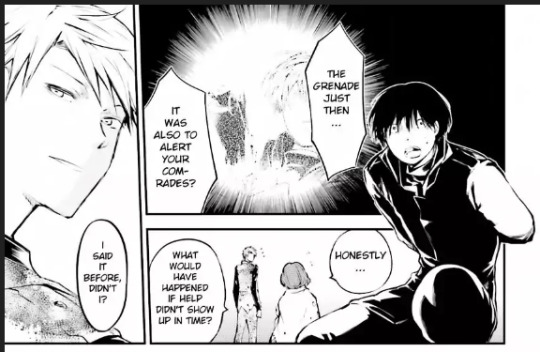
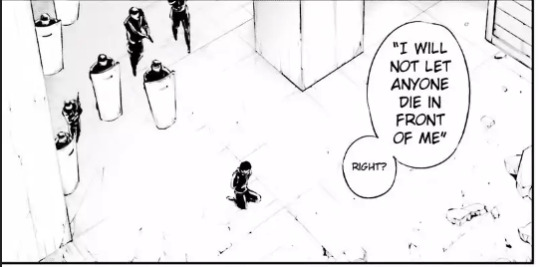
Kunikida struggles to save everyone in front of him, but that’s also because Kunikida is internally someone who is very fragile. He can’t handle the loss, especially losing those he is close to. When Atsushi is hospitalized after his first fight with Akutagawa, he pretends to be unconcerned. When Atsushi wants to save Kyoka, Kunikida tries to persuade him to not save her. Oda and Kunikida are both avoidant characters, Oda avoided ever stepping inside of Dazai’s loneliness, and Kunikida avoids getting close to others because they fear the people they cannot save. Kunikida cares so much and so deeply, that he’s completely shattered when he fails someone.

Every strategy by the detective agency’s enemies relies on crushing Kunikida because he’s the easiest target. When he fails like this he wants to give up. Kunikida and Oda have this dark underside to their actions where they’re fighting continually to be better, but when they fail, they long to throw their lives away and give up the struggle.

Part of the reason they’re attracted to Dazai is deep down Kunikida and Oda both have the same suicidal feelings. Kunikida knows that his ideals will never live up to the reality.

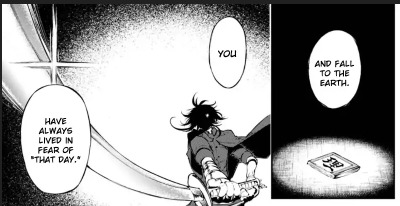
However, secretly he longs to fail so he won’t have to struggle against it anymore.
“I let go of Dazai. I understand what he’s aying. Perhaps righteousness isn’t something you seek in others, but something you search for inside of yourself.
Even then...
Miss Sasaki is dead, and so is Rokuzo.
All I’ve found in my search for righteousness within myself is a sense of hopelessness.”
Osamu Dazai’s Entrance Exam
The question is can you continue to live? Even if you fail over and over again to do better. Even if the things you try to protect all die. Kunikida’s arc so far mirrors Oda’s. The things he told himself he would protect, he failed to. The promises he made, he breaks. He said he was never going to watch a child die in front of him, and then it happens.

He said he was never going to fail to protect the agency again, but then the agency became the victims of the hunting dogs, and Kunikida had to go completely on the run. He said he was going to throw himself away in a big bang against the hunting dogs to show his ideals would never fail, and instead.
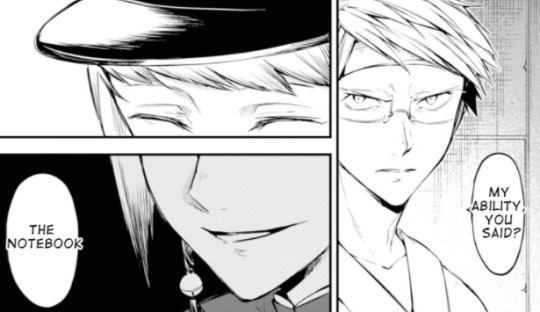
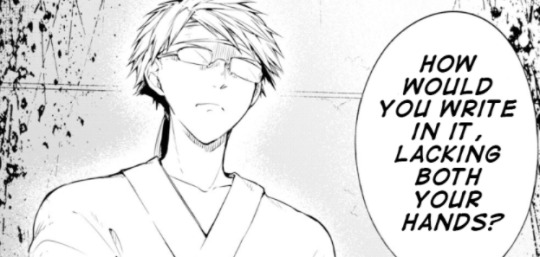
He even loses his ideals and his ability to write in the notebook. So, what is the difference between Kunikida and Oda that allows Kunikida to keep struggling where Oda did not. I think it’s not really a difference between them, so much as it’s a difference between Dazai. Dazai’s grown since then and realized his mistakes with Oda, and because of that doesn’t stay at a comfortable distance from Kunikida.
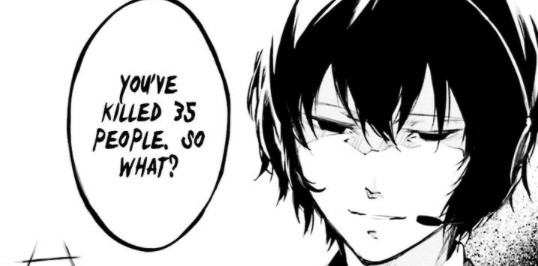
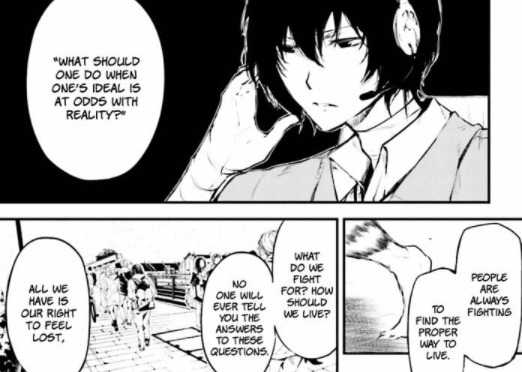
Dazai has grown enough between then and now he’s able to reach people who feel similiarly to him. He understood the suicidal feelings of both Kunikida, and Oda, but he didn’t reach out to Oda until it was too late. However, Dazai has grown to the point where he not only understands Kunikida’s struggle and sympathizes with him, but he’s also able to say the words he couldn’t say to Oda until it was too late.
There’s no such thing as a point of no return. There is no point where everything is already over. Even if you fail to protect someone, even if you fail to protect everyone.
"Anything I would never want to lose will be lost. It is given that everything that is worth wanting will be lost the moment I obtain it. There's nothing worth pursuing at the cost of prolonging life of suffering."
Dazai is still the same person that said this. Deep down that’s what Kunikida and Oda both fear, that after Oda failed the orphans, that after Kunikida could not save an innocent child in front of them, that no matter how hard they fought all of their attempts to protect someone would fail that way. At which point their fighting seemed to become meaningless.
Dazai knowing those feelings has moved past that lament. He still believes that the struggle may be meaningless, but he reassures them that they can keep fighting anyway.

If there’s no great glorious ideal to live for, if nothing we do matters, than all that matters is what we do. The world isn’t good, the world will never be as good as we want it to be, yet Kunikida can still strive to be good in the face of that.
#dazai osamu#kunikida doppo#oda sakunosuke#odasaku#bungou stray dogs#bsd meta#bungou stray dogs meta#bungou stray dogs theory#bungou stray dogs analysis
571 notes
·
View notes
Text
Sacrifice for the Three Lords
So. Got curious about something.
Curious thing got long lol, under the cut
The word sacrifice has a very loaded, very intentional feel to it. For something to be sacrificed, it must be considered less than whatever it is being sacrificed for, whether in the moment or in the long term - it’s the logical conclusion to the act itself. Even if regret for that choice can come later, at the time you are sacrificing whatever is being sacrificed, it is considered less (for example, spending an hour of your time for a stupid meme post you spent too much time on, for a light-hearted start. In hindsight you might think it was stupid or not worth it, but at the time of bungling around in photoshop you considered the time lost as a worthwhile sacrifice to your end product).
With that in mind, how do the three lords view sacrifice? When is it mentioned in their routes? When do they themselves mention it, and what are they pertaining to when they do? I want to focus on the word “sacrifice” specifically, due to the already mentioned connotations and meaning attached to this word in particular
We’ll start with Claude, with his route’s first mention of the word sacrifice being, and I’m not kidding, post ts, at Ailell
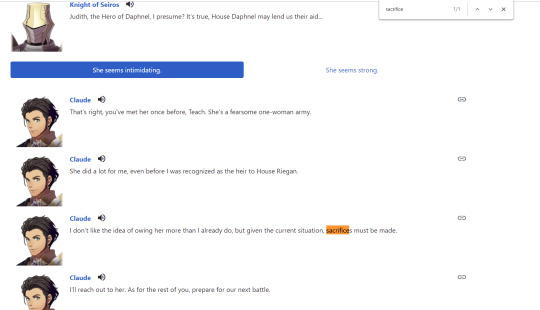
What is being sacrificed here is Claude’s independence from Judith. He is expressing a want to not rely on Judith’s help once again but needing to give up that want in order to move on with his goals of winning the war. This is something that he alone is sacrificing with no involvement or need of sacrifice from anyone else - he is the only one losing something from this sacrifice.
The next mention is from Hubert’s letter

The sacrifice being mentioned belongs to Edelgard. Hubert is stating that Edelgard has made sacrifices that must be honored, heavily implying that they were necessary for her goals if they hold such importance as to keep that importance beyond the grave to be passed by those who have defeated her. Claude himself is not sacrificing anything, nor does he state any agreeance to the phrasing used here, but he has said earlier that her methods use too much bloodshed for people to rally behind, implying a disagreeance.
This is the last time the word sacrifice is used in direct relation to Claude. When it comes to all that has happened to others, Claude specifically does not refer to it as something like a sacrifice that he is making.
Though that does not the word is not used further in VW. Dorothea, in VW:

The sacrifice being made here is deliberate and willing on the part of Count Bergliez. He is making the consenting, thoughtful decision to sacrifice himself because he views his men’s lives as more important than his own, and it is implied that his doing so achieved the desired outcome (the safety of his men). He came to this decision by himself, with no outside force making him do this (outside of the circumstances that prompted it - no one person made him do this). The act of sacrificing yourself for the lives of others is portrayed in a explicitly “positive” light coated in tragedy and even then only if it achieved its goal
Lastly, for unique mentions on VW, Annette:
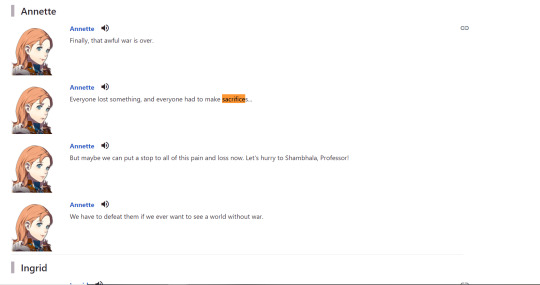
Forced sacrifice is seen as something painful. The making of circumstances where sacrifices must be made outside of the will of those making it is portrayed in a explicitly negative light that is sought to be rid of.
In VW, Claude himself never refers to the loss of life as a sacrifice, and only ever refers to something as a sacrifice when it is him making it in a way that does not affect others. Sacrifice of life is only referred to as “positive” when either 1) Hubert, an amoral character who cannot be part of VW, makes mention of it, or 2) it is the singular sacrifice of one person’s life that they made of their own volition in order to save others, and even then it is portrayed in its context and in later contexts as a tragic event nonetheless
Next: AM
The first mention of the word sacrifice for AM - or in this case, BL - is after Lonato:
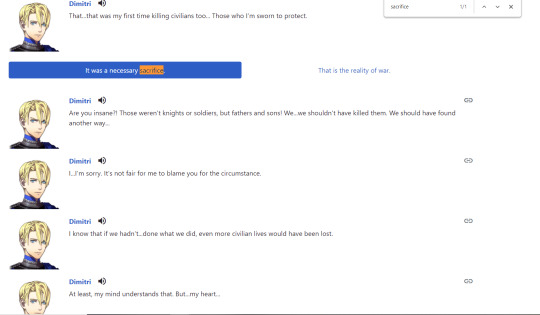
The word sacrifice is not brought up by Dimitri. Byleth says that the loss of life must be accepted, the result of which is explicit denial from Dimitri of the supposed importance of sacrificing civilians. Sacrifice of life -and the direct phrasing of it as a sacrifice - is explicitly portrayed as bad in the eyes of Dimitri; he does not believe that life ought to be sacrificed to achieve one’s goals
Next time, post ts:

The sacrifice of lives is directly, verbatim described as needless. The concept of the idea of lives being less worthy than a cause is explicitly called wrong. Human life is given more value than any goal.
Note how this is a direct reference to his behavior in VW, where he sacrifices his life as well as those around him - save for Dedue, whom Dimitri not sacrificing is what allows VW’s story to continue (due to Dedue providing the blueprints to the throne room for the Alliance army to navigate through). Dimitri’s choice to deliberately not have Dedue sacrifice his life is a positive to the overarching story of VW, while his indifference to the now explicitly needless sacrifice others’ make of their own lives for his personal cause is portrayed in a negative light
And while we’re talking of Gronder (note, this also appears in VW and thus also applies to VW):
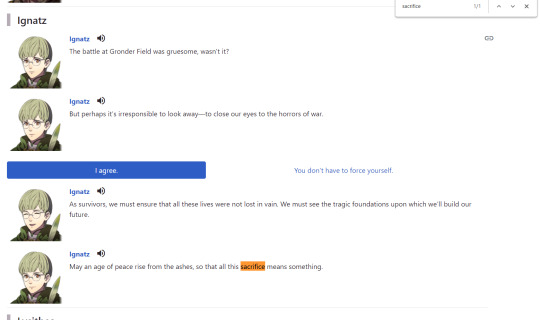
Ignatz’s further implies that the sacrifice made at Gronder does not mean anything - it is senseless, and without purpose. It must be given meaning after the fact; it holds nothing in and of itself, as it did not bring about its desired outcome
Next, Catherine:
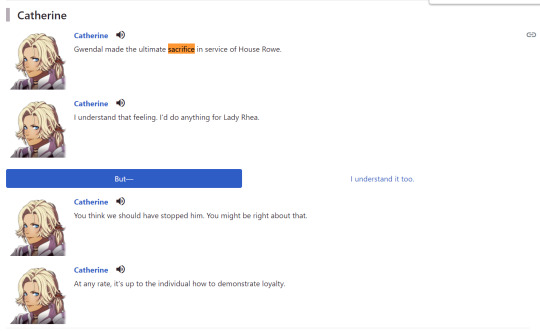
Sacrifice of the self is seen in an understanding light while simultaneously being seen as something that ought to be avoided. It is also something that is shown to be something that must be up to the individual to decide for themselves, though is regardless seen as something that likely should be talked out of doing
Last for AM, Felix:

The voluntary, willing sacrifice of one’s own life, for the betterment of others, is portrayed as something “positive” that must be repaid by those which the sacrifice was made for. It is not something that can be morally justified in forgetting after the fact - the repayment needs to be made in order for the sacrifice to be “positive.” The intended outcome of the sacrifice must be fulfilled in order for it to be seen as good.
In AM, sacrifice is continuously referred to negatively. Dimitri outright denies the possibility of necessary sacrifices, and the only way sacrifices are seen in a “positive” is if they are 1) willing made by the person sacrificing themselves and/or 2) the desired outcome of the sacrifice is definitively achieved, with the latter stipulation still having caveats that prevent it from ever truly being seen as positive (Count Rowe)
Lastly: CF
Edelgard mention the word sacrifice the same time as Dimitri first does, after Lonato:

Sacrifice of life is seen as a necessity. Edelgard views sacrifice as something that cannot be avoided, and as such, she has no qualms in sacrificing her people’s lives to achieve her goals. She views her cause as having an inherit superiority over the lives of the people.
Next, during the invasion of Garreg Mach (once you’ve settled on CF as a route):
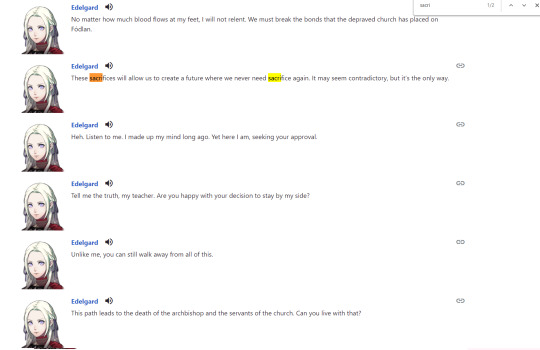
Sacrifice of human life is once again seen as a necessity for Edelgard to achieve her goals. She states that she will not stop no matter how much blood she spills for her cause. The sacrifice of life is involuntary to those making the sacrifice, and yet it is seen as something that will lead to a positive outcome. The cause is given greater importance over human life.
Next, post ts, before Claude is fought:
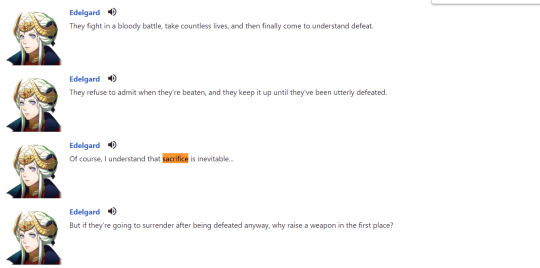
The want to not sacrifice own’s life for their cause is seen as a negative. The idea of attempting to save one’s own life at the prospect of certain defeat is questioned in its rationality. There is a lack of understanding in the idea of not sacrificing one’s self to the cause - this is further shown in Edelgard’s death in all other routes, which is caused directly due to her unwillingness to give up her greater cause. She views her own human life as having less importance than her goals, which is consistent with her ideology of sacrificing everything for the greater good.
Notice the other two mentions of the word sacrifice in CF
Linhardt, at the final chapter (which appears in all routes, mind, but since he does default as a BE I feel it pertinent to include within the CF section):
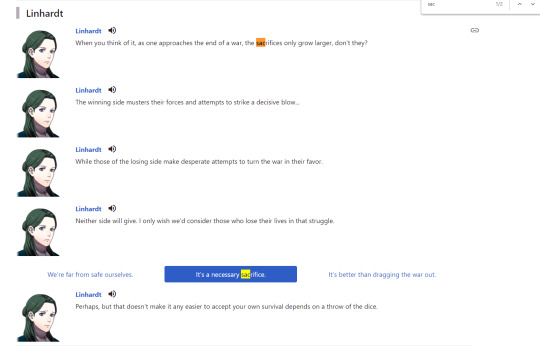
Sacrifice is seen as a sign of desperation. The idea of sacrificing human lives for a greater cause is no longer comforting or a good enough justification. It being described as “depend[ent] on a throw of the dice” directly implies no control from the one(s) sacrificing their lives.
And the last mention is from Rhea, during the last battle, referring to Rhea burning down Fhirdiad:

Sacrifice is being actively questioned. Edelgard’s reaction to Rhea forcibly sacrificing lives showcases the act as negative. Rhea, in all other routes, is one of Edelgard’s sacrifices she makes for her cause, and now Rhea’s mirroring of sacrificing the people’s lives for what she believes is right is being shown in a explicitly negative light. This is not Edelgard growing to realize that sacrificing human life is wrong as she does not reflect on her own doing so when she criticizes Rhea for the same thing.
In CF, when it is Edelgard speaking of sacrifice, it is always seen as a necessity - something that must be done in order to achieve change. Edelgard actively forces sacrifice on the people due to her believing that her desired outcome cannot be made without it, and so she makes little effort to mitigate this involuntary, large-scale sacrifice.
But, when similar ideals of the value of human life against one’s own cause is applied to those which oppose her, she no longer sees it as morally justifiable to sacrifice the lives of the people, despite her own willingness to do the same. When sacrifice is seen through the lens of someone other than Edelgard, the idea of sacrificing lives for the greater cause is no longer enough to justify it.
In contrast to Claude and Dimitri, who do not view such sacrifice as a necessity and thus do not attempt to justify it/force it upon others (except when Dimitri explicitly is doing something wrong, as directly stated by the game), Edelgard cannot fathom the possibility of being unable to sacrifice human life and achieving her goals at the same time. In contrast to Claude and Dimitri, who hold human life above their goals (except when Dimitri explicitly is in the wrong), Edelgard holds her goals above human life. Human life - including her own - has less worth than her goals, thus making it acceptable to sacrifice.
And, well. Considering that people are still being killed in most of Hubert’s endings due to all of the revolts and rebellions against Edelgard’s abrupt, violent, bloody rule rising up, the commonfolk are still not able to receive titles/military credits unless they marry into families which already have that (save for one character, who was previously noble already), and that freedom of choice is not guaranteed as shown by Bernadetta’s endings, along with the slew of other problematic elements in CF’s endings (especially when compared to VW and AM, whose endings portray a far more peaceful Fodlan)... yeah, the sacrifices absolutely did not achieve their stated desired outcome. And that’s when they were voluntary
#anti edelgard#Anti-edelgard#Edelgard discourse#Edelgard critical#just to be safe#and to be clear - Dimitri did not force sacrifice on his men on Gronder#but more that he only explicitly tries to save Dedue by telling only him to retreat if he's in danger (falls in battle)#he - in that moment and in specifically VW which is his lowest point character wise - has little care for the safety of his friends#Dimitri states that it's him sacrificing his friends when it's more accurate to say he was indifferent to their safety (barring Dedue)#hence the phrasing in that part#but uh like#overall#ignore my ass if this seems too reachy lmao#i just thought it was interesting to look into how each lord uses the word sacrifice specifically#since it holds such a dramatic and intense feeling to it#but i can see how it can sound kinda meh as a premise for analysis lmaooo#feel free to tear it to shreds lol
35 notes
·
View notes
Photo
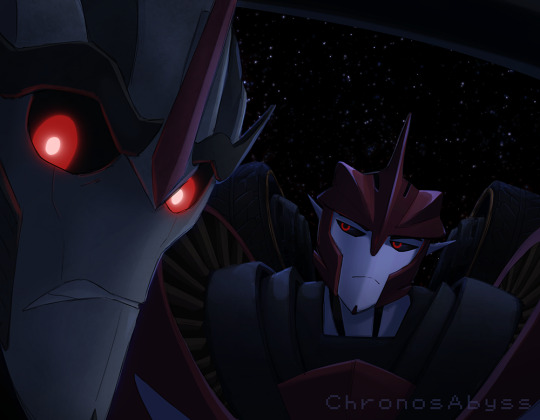
Chapter 1 of Decadence is live!
Summary: Starscream has instated himself as leader of the Decepticons while the Autobots deal with the aftermath of their attempt to take down Megatron. With the chain of command shaky on both ends, it's up to those remaining to pull their teams together to work past hurt feelings and decide which ideals are still worth pursuing. (Rated T for mild violence.) Story will be updated once a week until completed.
Below is a small part of ch 1. You can read the rest on Archive of Our Own. https://archiveofourown.org/works/28850817
---
"Status report?"
"Same old, same old. A full diagnostic of the ship is still in the works, but I have Breakdown running a complete structural survey as we speak. So far there are a couple of holes here and there, but nothing that needs immediate attention."
"And the crew?"
"Although Breakdown is back on his feet, I advised him against any strenuous activity for the next few solar cycles. Soundwave is still absent from the ship, and several troopers found Airachnid immobilized in a back hallway. I had her placed with the others that met a similar fate." Knockout brought up a quick list of numbers on his data-pad. "I've taken a brief stock of the Vehicon soldiers and it seems that while there were 46 injured and 38 frozen, only seven were beyond repair," he announced, eyeing the numbers.
Starscream raised an eyebrow. "That's good?"
"You trust my professional opinion don't you?"
Starscream scoffed. "Apparently it's why I keep you around."
"Then considering the damage we get on a weekly basis from the Autobots on the ground, we're golden."
"Right," Starscream said, unimpressed. "Have you had a chance to examine Optimus Prime's condition in cell block three?"
"With the exception of minor battle damage, he seems relatively healthy. You know, aside from being a living doorstop."
"How’s the crew taking Megatron's sudden absence?"
The medic let out an uncertain tone, glancing sideways for a moment. "Eeh, morale could be better. You've got your typical post battle unease. Word's spread of Megatron's demise, but no one's really sure what happened."
"Good. Let's keep it that way," Starscream finished, starting to turn away.
Knockout sidestepped around to get in front of him. "Starscream-" Seeing the dirty glare his commander shot him, he hastily corrected himself. " Lord Starscream. The whole ship's on edge. Everyone's talking. The more astute bots have even drawn attention to the fact that the Autobots somehow managed to gain access to our ship while it was cloaked, something that I need not remind you should be nigh impossible."
Starscream narrowed his optics almost threateningly. "It was the scout. Most likely he was using a concealed means of communication to contact the Autobots while he was on board. A tragic oversight, I admit, but nothing more. I've been meaning to gather the troops together to address the recent change in command. I’ll make it a point to bring up at the assembly. Is that all?"
Knockout hesitated, wary for once at the possibility of pushing Starscream too far when he was already testy. Eventually his curiosity won out. "There is one other thing I wanted to ask you about. At this point most of the ship has been combed over by the casualty crew to gather the downed soldiers for repairs. While there are a few isolated machine levels and storage corners that still haven't been checked, there has still been no sign of our former Lord Megatron's body."
A brief flash of alarm flitted across Starscream's faceplate which he quickly masked with a more neutral expression. "Do you really think I would have left the corpse out where any common soldier could see?"
"Alright then. Where did you have it moved?"
"Well um," Starscream stalled, a bit taken aback. "That's classified information."
Knockout sighed, shaking his head. "Really Starscream? If you didn't want me privy to such mundane details you shouldn't have made me second in command. How am I to make sure your ship is running ship-shape if I don't even know where our liege's body is stowed? The crew is asking whether or not there is going to be a commemoration in his honor."
"A commemoration?" Starscream choked.
"An observance, a memorial, whatever you want to call it," he gestured casually. "It's been nearly a full cycle and someone had to bring it up."
Starscream turned away, processor churning to come up with a reasonable explanation as he brought up several digits to tap agitatedly at the side of his faceplate. "Tell the crew that his body is too desecrated to be shown. Our liege suffered horrific damage at the hands of the Autobots. He would not have wanted to be seen like that," he finally said, wearing a mixed expression of both sorrow and unease.
"Fine, but that still leaves the matter of its location," Knockout said in a matter of fact. “As the ship’s chief medical officer, I’d like to perform an autopsy.”
"I told you, that's classified." Starscream crossed his arms childishly.
"So what, you're just going to keep Megatron's rusting chassis in your closet?" He held up his servos defensively. "Look, I'm not one to judge, but there are certain health regulations that must be observed when dealing with the disposal and recycling of the deceased."
"A-are you insinuating that I am keeping the whereabouts of our former Lord's body a secret out of some sort of sick fascination?"
"I'm only saying that whatever your reasons are, it would be nice to know a roundabout area so I at least know where I should be avoiding."
Starscream sputtered for a moment in an effort to formulate a retort. Failing to come to any sort of solid reprimand, he reached out and grabbed Knockout roughly by the lower jaw. "Why you-"
The sound of the door opening made both mechs freeze mid struggle. They looked over to see a dark slender figure standing just inside the doorway, observing them quietly.
"S- soundwave!" Starscream released his grip on Knockout's face, leaving the medic to shoot him an ugly glare as he rubbed a servo on the affronted area. "What a… nice surprise," he continued through a forced smile, his optic ridges drawn up in a twinge of anxiety. "Where have you been?"
#Transformers#Transformers Prime#TFP#Starscream#Knockout#Fanfiction#Transformers Fanfiction#It's been a long time coming#I weep with joy
95 notes
·
View notes
Note
Bud I’m sorry to swing into your inbox uninvited like this but my soul is having an OOTS renaissance thanks to your content in the tag and did you say Leverage AU
haha holy SHIT this got Long. but yes. i’ve been. Thinking. (also literally Never feel like you have to apologize for sending me messages. i was Hoping someone would ask me about this. now i have an Excuse to share EVERYTHING ive written abt it :3)
Obviously, Roy is the leader/brains of the outfit. He grew up having some Strong Opinions abt what’s Legal versus what’s Right due to tragic backstory involving the death of his little brother which was definitely SOMEONE’S fault for negligence but since there technically wasn’t any illegal behavior, there were no consequences for it. Also he’s still angry at his dad bc he thinks his dad is also partly culpable (and also also just a dick). He’s the Moral Backbone of the team (alongside Durkon, more on that later) in basically the same way Nate was in og Leverage. He’s actually not the best at figuring out what people want (that’s Haley and, shockingly, occasionally Elan), but once he has that info, he is the absolute best at figuring out the ideal plan of attack to use in any given case.
Haley is still a thief. I mean she maps to Parker almost PERFECTLY. Her dad was a thief & a conman, her mom wasn’t but knew about it and mostly accepted it, but she died tragically in a mugging gone wrong or smth, which made Ian crank the paranoia WAY up and taught Haley to do the same in the name of “safety”. Let’s keep the “Ian is in Trouble and Haley needs money, Fast” which is why she signs on to the first job in the first place. She’s less acrobatic than Parker, tending towards finding (or making) weak spots in security, but she can still make a tumble check when she needs to.
Elan is the grifter who is somehow an Idiot but also not???? It baffles everyone. When he’s playing a part for a con, he’s FLAWLESS, but then the rest of the time he’s just. No Thoughts Head Empty. He probably gets lured in initially because he’s decided to try his hand at being part of a full team, rather than the two-man cons he’s been running that invariably end w his partner conning him as well and stealing half of his take. Also he likes the idea of being Crime Friends. He’s that tweet where it’s like, Roy: “after the heist is over, we split up and never communicate again” / Elan: [about to unveil his Crime Buddies Forever Friendship Quilt Puppets]: “never?”
Vaarsuvius is the hacker/gadget person. They have a Vaguely Snobby Yet Unidentifiable accent, dyed(?) purple hair (nobody has ever seen their roots) and nobody knows who they “really” are or where they came from, but they’re good at what they do so everyone just accepts the mystery. They probably got suckered into the team by their initial employer (who I’ll get to Eventually, lol) framing it as a challenge to their intellect, like, “oh, I see, you’re not smart enough to make this team work for you...” to which they were like Fucking Watch Me and also melted his computer. Anyways. They are joined (digitally) by their Intrepid Friend And Co-Conspirator (his words, not theirs), a fellow hacker known only as Blackwing, or, on certain forums, Blackwing_Bird. (In the first season, V only occasionally references him when saying they’re “calling in extra help” or smth for a particularly complex hack job. He starts showing up a little more in s2 and eventually by the start of s4 is a regular & established presence, but only appears as actions in a computer interface or output.) Elan is convinced he’s an AI, Belkar doesn’t think he actually exists, Haley pretends she doesn’t think he exists, and Durkon and Roy try not to think about it too hard, as long as B and V still get the job done.
Belkar is the hitter. He is on the team bc their initial employer got him out of jail for it. He doesn’t have a tragic backstory, he just likes doing violent crimes. As the series progresses, he grows some empathy & stuff, but really only for people who actually deserve it. Assholes still get decked. It’s all very touching. (Also he has dwarfism caused by achondroplasia. It doesn’t actually bother him and is useful in fights bc his opponents frequently have no fucking clue how to approach him, but he likes Pretending to take offense at stupid things just to see how far he can go with it.)
Aaaand last but not least, Durkon is the least involved member of the team. He’s actually a career criminal and Roy’s mentor, and wasn’t a member of the initial team that [redacted, I’ll tell you later, PROMISE] put together for a couple of reasons, the main one being that he’s Officially retired in order to spend more time with his family, which consists of his mom, his friend (not girlfriend) Hilgya, baby Kudzu, and a truly stunning number of aunts, uncles, and cousins. Roy frequently calls or visits him for advice and he Occasionally shows up to help out on local jobs, but generally he avoids doing crime if he can (as part of a deal with Hilgya, who is also a career criminal; basically, they’ve both cut back on the crime in order to provide a more stable home environment for Kudzu. But sometimes, you gotta do a little crime, and in those cases, Sigdi enjoys spending time w her grandson.)
NOW. THE BIG REVEAL YOU’VE BEEN WAITING FOR. Who got the team together in the first place?!
The answer: Lord Shojo (or whatever Normal Person Name you want to assign him). Now this is where it gets tricky: he had them do a thing that they thought was good, THEN they thought it was BAD, but then when they confronted him he revealed that it Appearing to be bad was actually a test of character and would they consider working as basically internal investigators for him? But then he had a heart attack, so, rip. But THEN it turned out that he’d left them a bunch of money anyway and they were all feeling kind of Inspired so they formed the Order of the Stick, LLC (which, no, i am not coming up with a new name, actually, because I just don’t care. someone else can come up w a justification for that name, tho, i’m sure it’s possible). Also Miko was there and was unhappy abt their actions, and also their general existence.
Moving on. Villains!
Redcloak is the Sterling replacement, because that DEEPLY amuses me.
Xykon is a season-long main villain, probably one that Redcloak finds himself working for but then “teams up with” (read: blackmails) the Order to bring him down bc even Redcloak finds Xykon distasteful. That’s season 3, let’s say.
Tarquin is another season villain, say season 2. Nale probably shows up pretty early in s1, actually, as another recurring antagonist like Sterling but uh. Less good at it. Anyways the s2 final 3 eps deal with them (accidentally) discovering that Tarquin runs some Evil Empire Company, then trying to outplay him and take him down. Idk if Nale still dies in this version tbh.
Tsukiko is a one-off s1 villain who returns briefly in s4 alongside Miko, who has gone well and truly off the rails.
Season 1 finale has to do w Roy finally getting Vengeance for his little brother.
The vampire squad is the s4 finale villain who do smth terrible to Durkon and then get the Mother Of All Revenge served up to them by the Order.
I envision the show as being 5 seasons (like og Leverage) but I’m not going to sketch out s5 because I think it should be based off whatever happens in the current story arc, possibly involving some legacy of the OotSquiggle.
Other stuff!
The Order of the Squiggle is a legendary criminal team from the 60s who stole a BUNCH of famous shit & then proceeded to legendarily implode. This has no bearing on the plot I’ve sketched out, I just think it’s fun.
The Sapphire Guard members should probably be reworked as FBI. I don’t care about most of them but I do think that Lien and O-Chul could be like, FBI agents who Choose to look the other way while the Order does their very-much-not-legal-but-still-fair Justice Crime, and maybe even help them out on occasion.
So, the Final season-by-season outline, based on everything I’ve written so far:
s1 e1: getting the team together, doing a con for Shojo, then at the end he dies and the gang is like “dang what now?" and intend to split up except then they Don’t.
mid-s1: Nale shows up and tries to trick the Order, but then gets beat like a drum.
late s1: Tsukiko is an underling of the Villain Of The Week, winds up in police custody. But She’ll Be Back.
s1 finale: Roy’s Vengeance: The Vengeaning. also we meet Redcloak as an antagonist.
s2 e1: the truth abt Haley’s father comes out
early s2: The Two Live Crews Job but it’s the Order vs the Linear Guild and the Linear Guild ARE all bad guys.
mid-s2: Redcloak returns. ugh.
late s2: the sapphire guard FBI makes its first appearance, hello O-Chul and Lien.
s2 pre-finale: once again they’re in conflict w Nale over smth, he spends the whole episodes making Cryptic Remarks, they basically beat him (like a drum!) but then the stinger at the end is that Tarquin reveals himself and Elan is like “Dad?!”, roll credits.
s2 finale, part 1: Elan is hanging out w Tarquin bc he’s DEEP in Denial, the Rest of the team tries to take Tarquin down, but it doesn’t work.
s2 finale, part 2: Elan finally gets a clue and they manage to beat Tarquin. still haven’t decided if Nale dies or not, but I’m leaning towards yes. also they rescue Haley’s dad.
s3 e1: fuck dude idk.
early s3: Redcloak shows up, AGAIN, everyone groans. he has blackmail on them, he wants them to take Xykon down.
mid s3: The Rashomon Job but it’s about stealing the Talisman of Dorukan and it turns out that Nale was there too (“oh!” Elan says. “I was wondering why I looked so weird in all those mirrors! But it wasn’t my reflection, it was Nale’s!” “Sweetie, that wasn’t Nale’s reflection,” says Haley. “Huh,” says Elan, “so the mirrors were broken?”, cue eye rolling from everyone else.), and the Successful thief was Hilgya, who’d nabbed it from the owner before it even went on display.
s3 finale: they beat Xykon, actually factually, because he deserves to get his ass Thoroughly kicked, even if only in AU form. Lien and O-Chul are there, so are some other less helpful FBI people. There’s a bit where O-Chul Exact Wordses his way out of telling his superiors about the Order’s less legal activities without technically lying. King shit.
s4 e1: doesn’t really matter. maybe smth to do w some legacy of Tarquin’s company to set up the drama w Malack & Durkon later.
early s4: Durkon gets SENT TO PRISON. Malack approaches the Order abt this because sure they have Different Ethics but they’re still Friends. (Roy is surprised and a little hurt that he’s never heard of Malack, but he ignores that in favor of Let’s Get Whatever Fuckers Did This To Our Friend.)
immediately after that: Miko and Tsukiko return as a Team, preventing the Order from working on the Durkon situation
mid s4: Redcloak makes another unexpected & unwelcome appearance but he’s maybe a little less of a dick? the Order collaborates with Malack & his Crime Buddies (hello, Vector Legion) to pull one over on him tho, because “less of a dick” does not mean “a pleasant or decent person”, and also he was mean abt Durkon being in jail, so he totally deserved it. he still gets whatever he wanted tho, just takes a blow to his pride. also prevents the Order from helping Durkon. they’re having a LOT of setbacks wonder why that could be, not to make sure the season fills its whole length or anything, no sirree
s4 finale: something something taking down the organization, headed by Hel (yes that’s her real name), which framed Durkon for their Big Crime. Durkon goes free and Extra Firmly retires, For Good, He Swears, but says he “met someone new” who might be an asset.
s5 e1: minrah joins the team! and the episode is set in like, somewhere really snowy. that’s all i got.
the rest of s5: don’t know, don’t care, it’s open-ended until the comic finishes up.
#mine#ask#corvidcorgi#order of the stick#oots#leverage#leverage au#oots au#au#outline#haha this thing clocks in at 1.9k words because i am LITERALLY incapable of shutting up#hope u enjoy it bc i spent Way Too Much Mental Effort mapping out how the OotS plotlines might play out in a leverage setting#and then promptly ignored Most of that in favor of making it funnier & dumber & more villain-of-the-week#(bc lbr the comic is Good but it's got an overarching plot form that the Leverage story style does Not jive with)#i'm not tagging all these characters lol
32 notes
·
View notes
Text
Thoughts on Lostbelt 2
Longpost ahead.
So.
Lostbelt 2. Finally played it after so long, and this will contain spoilers.
To make sure everyone knows what they’re getting into, I’ll give the thesis statement right here: Lostbelt 2 is bad.
The entire time I played through the story, I kept waiting for it to pick up. I kept waiting for it to shrug off the poor pacing, the deus ex machinas, the random things just happening for the convenience of the plot. I kept waiting for it to shrug off the poor characterization, the constant telling instead of showing, the moral myopia. It never did.
From nearly the very start to finish, Lostbelt 2 is bad.
We start off fairly fine! A desperate ploy to sneak through the Lostbelt to meet up with the allies we’ve learned about, the Wandering Sea, interrupted by a Lostbelt Servant attacking us with the intent of stealing the Paper Moon that allows us to perform Zero Sails. All of that is a decent setup!
And then we’re told how strong this Saber is. How incredible they are. How their swordplay surpasses anything else they’ve ever seen, how they desperately wish that Musashi was there, how no no, he didn’t use his sword, he only parried! Things that Sherlock Holmes observes, not Mashu, not the one who’s actually been fighting for two years now, so Mashu seems borderline useless. Holmes figures out it’s Sigurd because...he uses a sword in a Scandinavian Lostbelt, and he figured out that Holmes used magic because Holmes fire magic lasers at him. From this, Holmes is able to pinpoint Sigurd’s identity, and that’s just the setup for the rest of the chapter, really.
To be specific, what I mean is that we will constantly be told how incredible someone is with very little evidence, and the plot will bend and warp to make certain things happen.
The scene does exactly one good thing, which is the foreshadowing of Surtr. Coming into it knowing that aspect allowed me to appreciate little bits like Surtr talking about Heroic Spirits like he wasn’t one, and Surtr not being able to kill Mashu because Sigurd resisted it. But that’s about all that was good in the scene, and all it really does is set up a consistent thing of Surtr being one of the only good parts - until he isn’t, of course.
I’m going to shift here from specifics to characters, because otherwise I’d be rehashing the entire story and I don’t have the time or effort required for that. That being said, it is difficult to decide where to start, so I’ll go right to the very building blocks of the story, the themes.
Lostbelt 2 is, very obviously, attempting to have a theme of different kinds of love throughout the story. Part of this is because it’s very much set up like an otome game that the author Hikaru Sakurai would write, with Ophelia in the center, but it’s a more general theme too, with Skadi and the others all building up towards it. Now, love is an absolutely wonderful thing to build your themes around, exploring and examining it can be great for stories. Beasts themselves do that, examining different varieties of genuine, but toxic love that allow them to be well-meaning monsters.
The problem is that Lostbelt 2 does not engage with these themes on anything but a surface level. Skadi represents maternal love, so she constantly talks about how everyone is her children and how she’s their mother. No examination of the desire to see her children grow, the pain she feels when they fight, the struggle of forcing herself to cling so tightly knowing that it’s suffocating them and going to kill them before they reach 26.
Napoleon represents passionate love, so he flirts with every woman he sees. No examination of why he’s so passionate or what drives him to burn so brightly, beyond a token mention that for some reason when he’s summoned he’s driven to seek out a lover, another aspect of things happening to serve the plot.
Sigurd and Brynhildr represent true, romantic love, so they act mushy the entire chapter from the moment the real Sigurd appears. Now, don’t get me wrong, I liked their scenes a lot and I’m happy that they chose that portrayal instead of the one I was afraid of where it was yandere jokes day in day out. But there’s no engagement with the fundamentals of their love, nothing that tests it, even the existing complications with Brynhildr’s tragic summoning are swept away with a single line of “I can resist them better now maybe because my saint graph is broken”, so ultimately there’s no conflict whatsoever. And sure, that’s nice, but it’s not very good if you’re trying to build your story around a theme of love.
Next, Surtr, who represents obsessive, dangerous love. I honestly actually think Surtr’s done well, even if the love he happens to represent is the least positive one. Surtr is capable of only one thing, destruction, and when he fell for Ophelia in that moment where she saw him and he saw her, he decided that if he ever had the chance, he would repay her the only way he knew how: allowing her to watch as he destroyed everything. When he’s summoned, he acts basically like the possessive one in an otome game, constantly talking about how Ophelia is his woman, getting angry when Napoleon flirts with her, spending most of his time pushing things between them as far as they can go etc. etc. I’m not particularly a fan of how his desire to repay Ophelia battling against his singular purpose transformed him into a typical possessive bastard boyfriend, but it’s at least engaged with on a deeper level.
Finally, Ophelia. She’s the otome game protagonist here, born into an controlling family and finally freed, hiding a secret special power, beloved by almost all the men involved in the chapter while she’s harboring feelings for someone else, even has the typical friendship route with Mashu going on. Her love is a love that she doesn’t acknowledge, but that’s all it is. It’s never engaged with beyond the fact that she clearly loves Kirschtaria but insists she doesn’t, and her final scene as she dies is Mashu telling her that yes, she did love Kirschtaria. That’s all.
For a theme of love that’s supposedly woven into the Lostbelt, it’s barely examined at all. It’s not well written, and in comparison to Lostbelt 1′s theme of what it means to live in a world where the strong devour the weak and how deeply it examined and engaged with that, it’s a genuine disappointment.
Now, to move onto the plot, it’s...in the abstract, it’s fine. Chaldea is intercepted and forced to fight in the Lostbelt and ends up dragged into the overarching ploy by Surtr to release himself and burn everything. That’s a perfectly fine story, but the problem is that when you get to the moment-to-moment stuff, it falls apart completely.
Skadi is constantly talked up as this incredibly powerful true goddess, not merely a Divine Spirit, and we know she can see and hear our every move because of her snow. How does the story work around this borderline omniscience within her Lostbelt? Skadi just decides not to do anything about Chaldea with zero rhyme or reason. We need to sneak into the palace and avoid alerting the guards, except Skadi already knows exactly where we are, except that doesn’t matter because we need to sneak in for some reason. We get captured with no plan to escape, and it just so happens that not only was Skadi keeping a Divine Spirit amalgamation locked in the dungeons too, but that she can piggyback on you making a contract with Napoleon (pure dumb luck you hadn’t done it before) and force a connection with you too, and then cast spells to hide you while you escape. Skadi knows we’re trying to free Brynhildr, who is the sole threat to Sigurd and Skadi’s own Valkyries in the entire Lostbelt? She just decides to do nothing at all.
So much of the plot happens because either Skadi makes terrible decisions to do nothing, even though she knows Chaldea is there to destroy her entire world, or it happens because random shit goes on that couldn’t have been planned for like Sitonai. Shit like Surtr suddenly becoming Fafnir and being able to use the Evil Dragon Phenomenon to brainwash Ophelia somehow, like Ophelia’s Mystic Eye being able to do anything the plot demands, even when it explicitly goes against its existing capabilities like rewinding time on Sigurd’s wounds, like Bryn and Surtr somehow being able to resist the effects of her eye with no buildup or explanation. It’s poorly written in terms of the exact events that happen, and that all culminates in Skadi’s one cool moment, where she declares she’s going to kill the seven billion we fight for for the sake of her ten thousand...and then right after, it reveals that Skadi was going easy on us and refused to use her runes of instant death for no reason even though she was fighting for the survival of her entire world. The moment to moment plot is not good, and neither is what comes next, the worldbuilding.
In Skadi’s Lostbelt, half the world is covered in Surtr’s flames, while the other half is blanketed in Skadi’s snow. Where the two areas meet are the only places where life can grow, and so Skadi set up villages there. Unfortunately, there isn’t enough food for everyone, so she enforces strict population control: if you are not the mother or father of a child by 15, you are sent away to be killed by the giants. If you are the mother or father of a child, you are sent away to be killed at 25 instead. Through this tragic method, Skadi enforces a limit of 100 villages with 100 people, a total population of 10000. This is all fine.
But take a closer look at what we actually see, and this falls apart. First, the giants. The giants are immortal and never need to eat. They do nothing but sleep all day and attack any human that comes close to them. Later, it’s revealed that they’ll attack any heat source including Valkyries, except we know that’s not true. Giants never attack each other, they never attack and destroy any of the plant life around them, they never attack the Lostbelt tree seeds, they even fight alongside mass-produced Valkyries before it’s revealed that Skadi and the three originals can mind-control them! They exist only to destroy, but Skadi can control them with her masks and indeed uses them as labour, keeping them chained up in her castle to be brought out and controlled as needed, or using them to guard Brynhildr’s castle.
Worst of all, the first time we meet anyone in the chapter, it’s Gerda, who is sneaking out of her village to go to the massive liveable area close to Village 23. This area happens to be the only place she can go to get medicinal herbs that she needs or one of the people in her village will die in childbirth. This area is also full of giants, who have not destroyed it despite being fertile and full of life and heat, and who are allowed to take this place that could be used to grow more food for humans who need it, and simply stay there doing nothing.
Now, this is where I thought the game would engage with things. How Skadi, in professing her love for all her children, is actually being cruel and unfair. They certainly set it up in the conversations she has, where she casually mentions how humans must die for her coexistence to continue. Skadi chooses to keep the giants alive despite the fact that they are all braindead and can do nothing but kill and destroy the moment their masks are removed. She chooses to keep them alive even though it comes at the expense of the humans who must die when the giants never make that same sacrifice. She chooses to allow them fertile land even though they cannot farm nor do they need food, and in doing so deprive the humans of potentially living longer, having more supplies to do so. She makes these strange choices and then later reveals she can control the giants to do her bidding, and it all seems to fall into place.
What we see from how she’s characterized early on is that the system is unfair and Skadi is unwilling to change, because it benefits her tremendously. Gerda’s village didn’t have enough herbs to save the children forced to breed by 15, and despite Skadi’s omniscience letting her know that Gerda had snuck out and was trying to save a life, she did nothing. There was no system in place to beg a Valkyrie to get these herbs, and no indication whatsoever that Skadi would use her powers to control the giants to save Gerda’s life. The picture painted is someone who cares about humanity not out of true care, but simply out of obligation. Those who disobey her rules, even for good reasons, are left to die by the engines of destruction she keeps alive.
That’s not the story it tells later on, though. Skadi, portrayed from the start as this all-powerful goddess with complete control over everything, is revealed to be far weaker than we thought, and far less monstrous. Ignore all the times she did control the giants, she actually can’t do it all that well. Ignore all the times she declared she would not allow anyone she loved to be killed, but chose not to act to tell her Valkyries or her giants or anything else to save either Chaldea or Gerda. Ignore the evidence we see on screen that there’s more land that’s simply taken over by the giants, Skadi can only make those initial 100 villages and can’t make any more. Skadi is not bad. Skadi did the best she could. Skadi is morally right.
Please love Skadi, there’s no complicated moral quandary here, she’s just Good.
Comparisons to Lostbelt 1 are impossible to avoid. Both have the same basic cause, a calamity that was impossible to predict and impossible to avert. The stagnation that dooms a Lostbelt created by the kings in question in their desperation to survive. Ivan turned humanity into the Yaga and created a world of strength, where progress is impossible because everyone in his new world was too busy devouring each other to work together. Skadi created a world of weakness, where progress is impossible because she limited the population to avoid everyone dying out. There is, however, one crucial difference between the two. Not in terms of story, not in terms of characters, not in terms of themes.
“Your existence itself has already become a grave sin.”
That one line, spoken to Ivan, is the biggest difference between how the story engages things. In both Lostbelts, Ivan and Skadi did horrible things and made horrible choices because they had to, for the sake of survival. Ivan twisted humanity into monsters that lost capacity for mercy or empathy, while Skadi forced brutal population control and careless death on humanity because of her refusal to allow the giants to be destroyed. Both of them did horrible things, but only one is held to account by the story.
What Ivan did was evil, and the story recognises it. It doesn’t accept the excuse that it was all necessary for survival, because that’s irrelevant. It’s evil regardless. This same sentiment should have been expressed with Skadi, but it’s not. Ivan is condemned, but Skadi is absolved. She had no choice. She did the best she could. After building her up as all-powerful, the end of the story instead destroys her agency and power in its haste to prevent any kind of responsibility falling on Skadi’s head. Even to the very end, where she declares that she’ll kill all seven billion lives we fight for for the sake of her ten thousand, she holds back and allows us to win, despite how it butchers her character.
The biggest irony in all this is that Ivan’s world was worse than hers in ways. There was no way for the blizzards to stop, no meat besides for the demonic beasts. Crops couldn’t grow, and instead of living in peace, the Yaga were constantly tormented and killed by the Oprichniki. There were no liveable areas like there are in Lostbelt 2, no merciful ruler that sees all, and controls the greatest threats, no peaceful villages where food can be grown. There’s far more justification for Ivan to claim he had no choice and that he did all he did for survival, because it’s hard to see what his choices were. But Skadi? Skadi intentionally does not act and intentionally allows suffering and pain to come to her children, both actively by not saving Gerda, and passively by allowing the giants to take land they don’t need. Despite this, Skadi is absolved, because the story desperately wants her to be a tragic waifu that you love.
There’s lots more I could talk about. How Sitonai was pointless and existed only for a pathetic FSN reference. How Gerda was a cowardly and manipulative piece of writing compared to Patxi. How Ophelia’s story of always being told what to do is resolved not by her taking the step to freedom herself, but being told to free herself by someone else. The constant repetition that plagues the chapter, the weirdly prevalent sexism that everyone gets in on when it comes to Ophelia’s love life, the nonsense of the final battle itself, the absolute nonsense of Skadi being Scáthach-Skadi. I could even talk about how I’d fix the chapter, because boy howdy there’s a lot there.
There’s lots more I could talk about, but this is already very long, and I think it speaks for itself. Obviously asks are available if anyone wants me to examine them in more detail, but for now, I’ll finish off with one last reminder.
Lostbelt 2 is bad.
138 notes
·
View notes
Photo
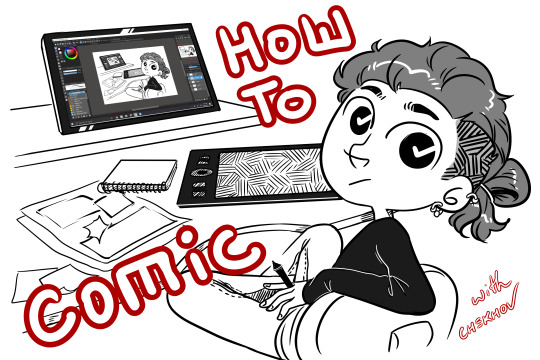
Due to popular demand, I’m making a 4-part series about how to make a comic! Check out the other parts while you’re here!
1) Thinking of a story
2) Making characters (this part)
3) Drafting pages (coming not soon)
4) Presentation (coming eventually, we hope)
So, here’s the big question:
How do you make a good character?
I’m going to have us step back for a moment to say:
There is no such thing as a “Good” Character. Because how good a character is or isn’t is subjective. We can argue back and forth for hours about what we value in a character, but no one will ever agree. You can’t make a character that EVERYONE will like, and you shouldn’t try to.
Instead, I urge you to focus on trying to make ONE or MORE of the following:
Relatable characters
Sympathetic characters
Useful characters
“What the FUCK is goin’ on here I just wanna know” characters
I think they’re pretty self-explanatory, but let’s go through it anyway.
1. Relatable Characters:
What is says on the tin. These are character you and someone else could relate to. Maybe they’re a teenager who hates school. (Timeless classic.) Maybe they’re a young adult down on their luck and in need of money, willing to forgo some moral standards to get by. (Millennials, roll call!) Or maybe they’re just like you (or literally you. We don’t judge self-insert. There’s a reason Write What You Know is a thing.)
Regardless of what you want to believe, many human experiences are universal. Some of them are universally unacknowledged, but they are still universal. You want to just be careful about falling into the ‘my character is so special and the rest of my characters are dumb’ trope. That isn’t interesting - or realistic.

(source: xkcd)
2. Sympathetic Character:
I also call this the Looking Glass Character.
Even if most of us have universal human experiences, many of our own experiences are also unique to us. Some experiences are things we will never live through - but we can still sympathise with the emotional state of the characters. If a story allows us to experience new things THROUGH a character, we feel connected to them.
Keep in mind - this character still has to be somewhat relatable. We have to be able to say “if I was in this situation, I would do that too!” Allowing your readers to believe what is happening makes the reading experience more believable.

(I’m pretty sure none of us have been a half-gem half-human hybrid suffering through trying to right your defected-the-diamond-authority war-criminal mom’s past mistakes, but seeing Steven repeatedly say “I’m fine!” as he descends into madness is something we can all sympathise with.)
Similarly, if your character is in the woods and finds a tiny house on the edge of the prairie and it’s getting dark and the house has flickering lights - whether or not they go inside is inconsequential to sympathy. What matters is if they have a good REASON to go inside. Sometimes, it’s not the actions that’s sympathetic - it’s the motivation!
(My sister disappeared in just such a house! I must get revenge! vs I’m a bored teenager with a potentially unrequited deathwish and/or a crush on a ghost. Well... scratch that, I can sympathise with both scenarios.)
3. Useful Characters
I was previously asked what to do to avoid making your characters into a Mary Sue. This part will be about that.
Let me start by saying: I don’t think Mary Sues are as prevalent as some people bemoan them to be.
A Mary Sue is a character that is often described as ‘too perfect’ - they can do everything, know everything, never fail at anything, have a tragic past that excuses every emotional outburst, and are overall just ‘too good to be true’.
I think, if played correctly, such a character can still be a good one. What makes all the difference is how useful these aforementioned traits are to the plot - or to other characters.
Let’s acknowledge some universal truths (aside from the one about the men in want of wives and the relation of such a desire in proportion to their fortune):
The plot must go on. That’s obvious.
In order for the plot to move, there must be things happening (in one sense or another). Also obvious.
In order for things to happen, there must be a conflict or a tension of some sort. THAT is your litmus test for a ‘Mary Sue’ character.
“If I remove them from the plot, will the plot suffer any holes? Will they impact the plot or impede it? Will their OP superpowers make some other worldbuilding completely useless? Will their incredibly tragic backstory overshadow another conflict between other characters?”
Characters should be like legos - they must have a function within your plot. Looking cool isn’t a function. Well, sure, it CAN be - but it must also be a function that doesn’t break Newton’s Laws. An object at rest will remain at rest. If your Perfect Character is already flawless, they have no reason to change, ergo nothing needs to happen.
Make your character serve a use within your plot!
4. WtFiGOHIWK Characters:
Do you ever watch a show, or listen to a podcast or read a webcomic and think to yourself “Okay, cool, but what the FUCK is UP with _____? What’s their deal?!”
I like to categorize these characters in a group of their own. These characters are likable ONLY because we all have a socially wired brain that makes us CRAVE comprehension of social background like drugs. We CRAVE THAT MINERAL. And the mineral is - gossip. Backstory. Tea. The DEETS.
Many characters are somewhat of an enigma, and the initial plot doesn’t give away all their secrets. We get hooked not because the characters are relatable, and sometimes not even because they’re sympathetic - but because their social tension within a group of other characters is RIDICULOUS and we are wired to want to understand them.
Everyone has their own examples, but one of my favorites is this asshole:
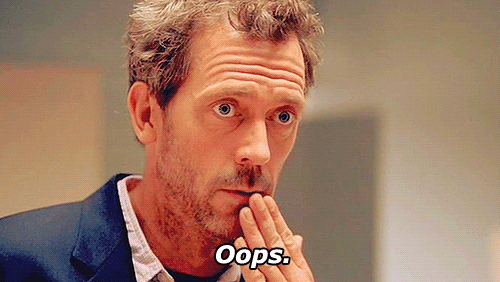
Do I relate or sympathise with Dr. House? Broadly, no. He’s obscene, rude, and most of the time he’s not even the good guy in any given episode. But his morality roadmap resembles knitting directions for a scarf and his reactions to the most mundane situations are FASCINATING.
(Never underestimate the power of human curiosity and how strongly it can work to make your readers turn to the next page, even if your whole plot is about a dumpster truck on fire next to a fireworks factory.)
Q: So how do I make a character?
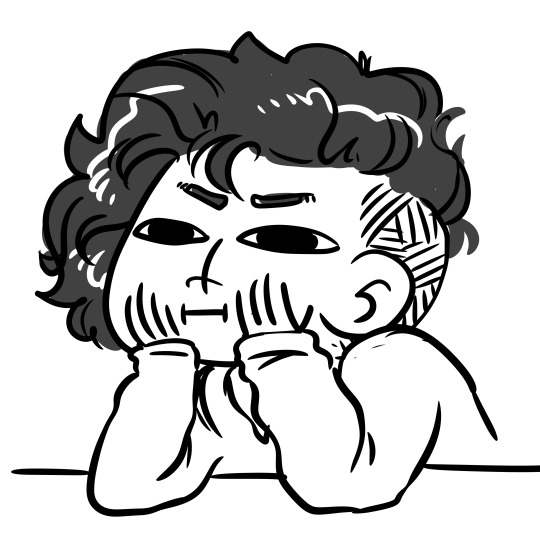
There are several options:
- Wait and do nothing. The character will happen when you least expect it or are least prepared. Now they’re in your head. They won’t leave. aaaaAAAAAAA!
- Take a person or another character you know. Change 3-5 fundamental things about them (I don’t mean name, hair color and shoe size... I mean something PERSONAL, like background, motivations, religion, dream job, species, etc.) BAM character. (I mean, is it QUESTIONABLE to write a story about your sister as a lizard who wants to go to the moon? MAYBE. Should she still be more grateful than she is? ALSO MAYBE.)
- Take yourself and change uhhh... at least one thing about the character. Try to veil the fact that it’s actually just you. Fail. Wipe away tears. Write the story anyway. Hope no one notices.
- Write a story in your head and then think “Who is the LEAST likely person to participate in these shenanigans?” There’s your character.
Q: What should I avoid in a character?
Honestly, you can go around to 100 people and ask this, and they’ll give you 100 different answers. What people dislike and like in characters is so vast that there’s NOTHING you can do to stop people from hating on a character.
But yes, there ARE some overused tropes and I want to share 1 rule that I personally keep to when making characters. (Keep in mind, this is MY personal list. It isn’t the end-all-be-all, and yes, you can argue about this. But don’t @ me, I don’t care.)
DON’T describe your character as “______ is kind and friendly until you piss them off - then they will kill you.”
This has been my biggest pet peeve since high school - and it’s unfortunately an absolute staple of any YA character. Someone is ‘friendly’ and ‘nice’ and ‘shy’ UNTIL - you hurt their friends. Then they go berserk.
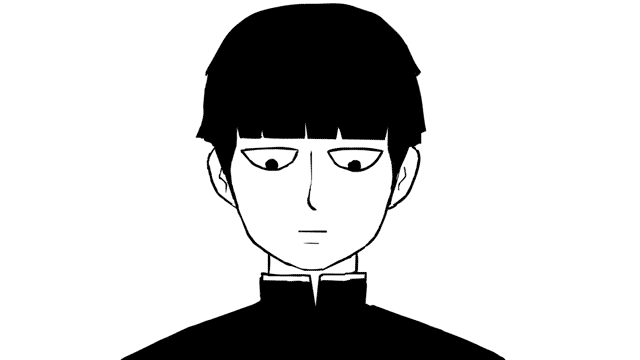
I know it’s tempting because ‘usually demure character lets loose their True Potential’ is a very empowering thing to see. (And I admit, I think Mob Psycho 100 pulled this Trope back in by the scruff of its neck and managed to get JUST the right angle for it to work.)
BUT it’s overused and it tells us absolutely NOTHING about your character. It’s a calorie-free fact. Feels like a description but is actively devoid of any interesting information about your character.
Why? Because literally EVERYONE is like this.
We are all, at a baseline, somewhat friendly. That’s... just how most people are. Societal convention tells us we must behave with some semblance of dignity and respect towards others in standard situations in order to keep peace.
And I daresay getting pissed off and Breaking Character is ALSO a thing that most humans experience. Getting angry when your friends/loved ones are hurt is the bare minimum necessary for being relatable.
Not to say your character can’t do this but - it doesn’t need to be described as a part of their personality any more than, say, the fact that they have hair on their head.
Q: How do I make my character more believable?
Research.
We all hate that word, because school usually teaches us to think of research as boring but it is ESSENTIAL to your desire to make ‘good’ (relatable, sympathetic, useful) characters.
IF YOU PLAN TO WRITE FOR AN AUDIENCE, THEN YOU NEED TO PUT IN THE EFFORT OF MAKING YOUR CHARACTERS MULTIDIMENSIONAL.
That means - knowing their background. Knowing details. Knowing cultural, financial, religious terms you need to know to write them believably.
I know, I know - what if I’m just writing for myself? you say.
Well, fine. If you’re not planning to have your work be widely public, if you’re just having fun and don’t care, then write whatever you want. Make a Japanese character with a Korean name. Force your UK characters to use USA slang. Forgo any historical accuracy. Change up facts! Erase the moon landing, whatever.
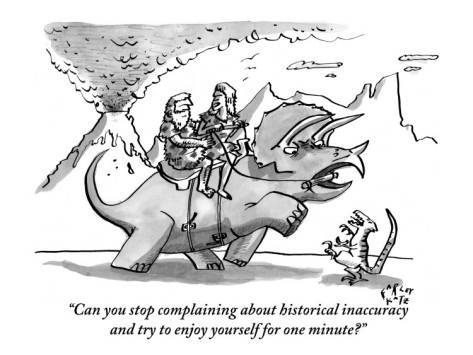
But if you want to share your work with people, and if you want people to interact with your writing on a more serious level, then you NEED to know how to use Google and gather at least SURFACE information what you are writing. If you don’t but pretend you did, people WILL be jolted out of their zone.
Research the things and people you are writing about. And more importantly - READ about the experiences of the people you are writing about! Avoiding Stereotypes in this day and age is EASY. You literally have an endless, free encyclopedia in your hands. If you can send a tumblr ask, you can google it.
That’s all for now, and CHEERS!
1K notes
·
View notes
Note
I think the biggest reason why people saying it’s sad JC basically has no one bugs me so much is because more often than not, the people saying refuse to acknowledge why that is. There’s a reason why JC isn’t close to anyone after 13 years. There’s a reason he hasn’t married, why his sect keeps to themselves, why people are afraid to anger him. Yes it’s sad he’s alone but there are reasons behind why that is 1/2
MXTX didn’t do him dirty like many like to claim. She uses JC to show what happens when you put your own interests over others too many times. When you let the negativity rule over your life. JC is meant to be WWX’s opposite from their skills to personality to their morals. There’s a reason why WWX ends his story happy and content with his new life while JC is only just realizing he needs to move on. It’s sad he’s alone but what makes it so sad is that he did it to himself 2/2
MXTX did a good job of giving every character still alive at the end of the novel the ending they’d earned. For WWX and LWJ, that meant a happy ending, finally free to be together. For JC, it meant as far as we can tell a lifetime alone, trapped in the knowledge that he could have had people by his side if he hadn’t chosen to drive them off. He is alone because he chose to be alone, even if he doesn’t realize that himself. Frankly it would’ve been a betrayal of the themes of her story for MXTX to give JC a happy ending, because MDZS does have a strong running theme that the past will always catch up to you. No matter how rich and powerful you are, eventually you’ll piss off the wrong person, or too many people, or just hurt good people too damn much, and it will come back to bite you. There’s no escaping what you’ve done forever. JC is powerful enough to avoid any political or legal consequences for his actions, at least for now. But his cruelty does have repercussions; just like how JGS was murdered by JGY for his mistreatment and JGY was in turn killed for NHS’s revenge, there’s a price to pay for the way JC treats those around him. In his case, that price is the loss of everyone who might have stayed by his side and loved him. WWX and JL would’ve stayed with him if he’d been even slightly good to them, if he’d done anything to support them and treat them with the love he supposedly held for them. He chose not to. They left because he chose to drive them away. He’s alone not because the rest of the cast is mean, or because MXTX did him dirty, but because that’s the ending he earned with his actions.
Also I hate the argument that MXTX “did JC dirty” in general because... no one’s arguing she did XY or JGY or SS dirty. JC may not have been an out-and-out villain but he was an antagonist, and he got an antagonist’s ending. I imagine she’d planned JC’s ending out before she started writing him, because everything he does from his first appearance is leading up to that moment in the Guanyin temple where he finally goes too far for even WWX to accept and he leaves. The last ally JC had left, the last member of the family he grew up with by his side... and JC drives him away because the thought of setting the past aside and moving forward is too much for him to even consider. JC loses WWX in the end, specifically because he was trying so hard to keep him leashed to the Jiangs through guilt and cruelty. That’s the ending the story was building towards for him. It’s what he earned, not something MXTX just... chose to do. Authors don’t tank their characters’ storylines just for shits and giggles. She didn’t just decide she hated a good boy character and give him a tragic ending because of that, she planned for JC to end up where he did. Perhaps consider that when an author sees fit to give a character an antagonist’s ending it’s because they’re an antagonist.
40 notes
·
View notes
Text
So the majority of the shows I’ve seen lately can be charitably described as ‘light entertainment’, including the ones with dark elements or more weighty, ponderous plots. They might be entertaining or interesting, they just... don’t stand up to scrutiny. Turn your brain off because this isn’t that carefully or skilfully made and you’ll only be annoyed if you start thinking about it as a whole. Including the last couple 'tragic’ historical dramas I’ve watched, which were not effective tragedy for that very reason. If you’re going to kill off the main cast, you have to earn it, and overwhelmingly writers don’t. Anyway, I’ve been getting despondent about whether stories which actually hang together and form a coherent narrative unit with consistent themes are the exception rather than the rule.
(And I feel like that should be a pretty low standard to meet, it’s sort of Step 1 of ‘being a story’: be about something! Communicate something, no matter how basic it is. Dead simple stories with rock basic messages can be revelatory! Just do it well!)
I’ve seen very little genuinely focussed or meaningful storytelling in my ventures for what feels like a long time. Basically, I can kind of count on one hand the number of films or dramas or whathaveyou I’ve seen from the last few years where it felt like the filmmakers were in complete control of their story and everything in it was purposeful and intentional. Most things have felt slapdash or shallow or fleeting. Story elements and character choices come out of nowhere just to derail already concluded arcs and fill screen time with empty repetitious drama, not to serve a meaningful narrative purpose. I would be watching with zero confidence anything in particular was going anywhere or that the writers knew where that should be. It’s just throwing shit at the wall, fly-by-the-seat-of-your-pants type writing all the time and it fucking shows.
But then I watched Money Flower.
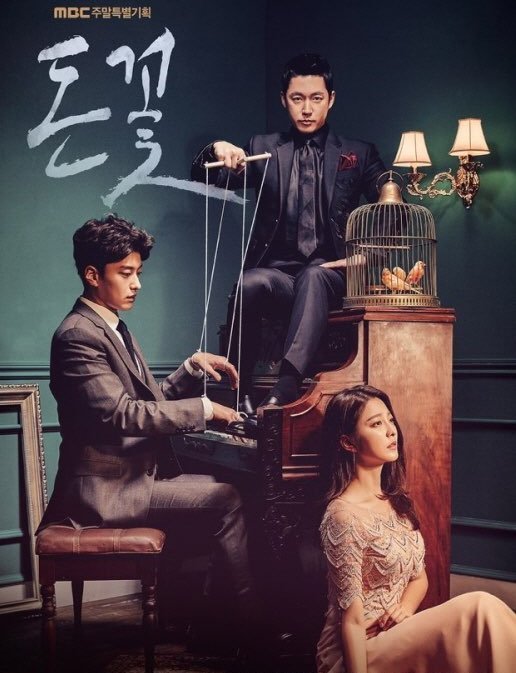
Money Flower is different. Money Flower is towering head and shoulders above every modern drama I’ve ever seen. Titanically good writing which rises above its genre and makes conventions seem radically new and fresh not by reinventing them or deconstructing them, but by playing them straight, taking them seriously, and committing 1000%. This is all your familiar rich family tropes but with masterpiece execution, infused with consequence and meaning because they’re all driven by the psychology of complex three-dimensional characters. So many moving pieces and none of them are random or unmotivated. Just... GOOD WRITING. And I want to make the point that it is this wherein art lives. The difference between a rank Lifetime movie and Romeo and Juliet is not novelty or tropes or plot twists- it’s execution.
This show is such a perfect example that it is not ‘mere events’ (aka plot) or novelty or shock value or cool ideas which separates something brilliant and timeless from forgettable schlock; it is solely and entirely execution. It’s writing itself, if you know what I mean. You can describe many of Shakespeare’s tragedies and history plays as soap opera plots. What makes Macbeth a deathless masterwork and Death Wish Hollywood wank isn’t a fundamental difference in subject or genre. It’s Shakespeare’s characterisation and purposeful storytelling. It’s the poetry of the dialogue. It’s the craft of writing. Most of Shakespeare’s plots are based on existing stories or on historical events and that has never mattered because novelty is not an inherent good or of any inherent artistic value.
Like, this is the problem with storytelling right now blah blah GOT, shitty endings everywhere etc. because power over the audience (can’t let anyone guess the plot, looking ‘clever’ with meaningless callbacks) and novelty are valued over narrative structure or things making sense or emotional verisimilitude. We have so many writers thinking being ‘shocking’ is all it takes to be a genius. It’s easy to be shocking if your story makes no goddamn sense because things that don’t make sense are literally unpredictable. Not in a good way, though. A great twist or sudden swerve needs to be unexpected but inevitable in hindsight or it does not work. I should be able to rewatch your thing and think ‘oh, of course! you can see it was [x] all along!’
We have so many popular writers now who are so shallow they don’t think anything needs to make sense on a character or emotional level. They don’t think their story has to be about anything. Substance is irrelevant as long as the surface is flashy enough. That has no staying power, you can only watch it once and you will forget about it quickly.
However, if you have ever wanted to experience the constant heightened stakes and High Drama of a soap opera without being annoyed at how ridiculous it all is and while actually giving a shit about the characters because they feel like real human beings, if you’ve wanted to feel repercussions when characters make choices, and get the emotional payoff that is the entire point of drama- now you can. Watch Money Flower. And let me tell you, it is fucking riveting. This show is mostly made up of people sitting in rooms talking and yet it is heart-pounding excitement nearly every episode. It is profoundly traditional and by the book while being totally fresh. It’s the most engrossing and satisfying artistic experience I’ve had in a long time.
Like, THE TENSION, THE DRAMA, THE REVEALS!!! You can, in fact, spend most of 24+ hours on the edge of your seat about family problems and business mergers. It seems unlikely, but that is the power of this series, it creates insanely high stakes and mesmerising suspense out of the most commonplace ingredients. Familiar plot elements become brand new and surprising under the deftness and tightness of this narrative. The plot itself is certainly 100% melodrama but it never feels like a soap opera and is never ever soapy in in a pejorative sense because it handles its classic tropes with such maturity and nuance that it's like you've never seen them before. The writing is incredible.
It is on an entirely different level than the vast majority of dramas, with a total self-assurance that keeps the pacing relentless yet unhurried- taking its time to let the impact of events be felt, the narrative always knowing exactly where it’s going and how to get there. The characters are all multi-faceted and unpredictable without ever being incoherent, their motives and goals always being gradually uncovered in more detail that only makes the storytelling and characterisation even tighter, even richer. The twists and cliffhangers are always mind-blowing but always earned, never cheap or nonsensical, and I can't remember ever thinking that about another show. (There’s literally one exception towards the very end where something a bit random happens for reasons of pure symbolism- it’s a misstep imo but it’s minor in the scheme of things)
Every time I started to doubt the writing, started to think ‘oh no, they’re going off the rails’, they showed me I was wrong and they were in total control. The only 'problem' with the show is that the drama is also profoundly painful to watch unfold, particularly in the beginning, because it's a story where everyone makes terrible life choices and moral corruption is everywhere. It's hypnotic though, like a car crash. If you can handle something dark, insidious, cerebral, and character-driven there is nothing I've seen in the same vein that can approach its brilliance. It’s like The Magnificent Ambersons as a slick modern revenge drama. There is also (PRECIOUSLY!!) a core of stunning romanticism around which all the horrors revolve and that saves it from becoming hideous or cynical. There is a chance for redemption and a new beginning after all, in spite of all appearances.
The ending has apparently been controversial, and it is definitely not quite as climatic as you would have expected given how powerfully climatic almost every regular episode is, but it's a good ending. There isn't full closure, they don't provide final resolution in a bow, but to me it's an ending about hope. It suggests optimism for our characters and I was satisfied with that. It's extremely rare for a 'revenge story’ to allow this kind of room for healing and it can do that because, imo, we discover in the end that it wasn't ultimately vengeance in Pil Joo’s heart. He has not become a tragic hero who will be consumed by the cannibalistic darkness of revenge, his quest was for justice. He teeters on the edge of the abyss but he avoided falling in; he didn't sell his soul, at least not irrevocably.
He is nonetheless a very tragic figure and an anti-hero, but despite having dedicated his life to bringing down the Jang cabal, it’s not that he’ll stop at nothing. He will make any personal sacrifice no matter how desolate, he lives as a mere husk of a man, and he facilitates enormous emotional harm to others in service of his goals, but he has ethical hard lines he never considers crossing. His sense of decency and compassion is never extinguished; he does care about the collateral damage he is causing even when making justifications for it. It’s important to him to give people as much agency as possible in their choices, to mitigate the damage done by his schemes as much as he can. To try to prevent harm coming to undeserving bystanders. Not that this makes it okay that he uses people, which he does, but the point is he never completely surrenders his moral compass to avarice. He’s never okay with burning down the world or ruining innocent lives just to get to his target.
Pil Joo is less a vigilante and more an avenging angel, he wants justice more than retribution. He wants fairness and a better, safer world where what has happened to his family won’t happen again. The reason this story never becomes Sweeney Todd (aka: a full on tragedy where we see the inevitable outcome of lust for revenge) and the reason he can survive twenty years spent pursuing someone’s downfall is exactly that principle. Searching for retribution would have destroyed him, he would have become the very thing he hated, but instead he goes as far as necessary to publicly expose the Jangs for what they are and then willingly submits to penance for his complicity in their crimes and tries to atone with the people he hurt along the way. Purged, he’s symbolically reborn and takes back his real name to maybe finally have a chance at the life he should have had. He moves on, content, a positive force. He’s capable of healing from the ordeal because he realises he doesn’t need retaliation, just seeing them stopped and facing consequences for their actions is enough.
The love story is a superbly poignant part of this. Their love is the ‘victim’ of his revenge and it will forever be impacted by it, but it’s not something that can be killed, so there’s still hope. Mo Hyeon’s bookending rescues of Pil Joo from death mean first that he has a purpose he must fulfil and then the second time that he has freedom to finally live as himself, for himself. There’s a future. And maybe they can be together there. I’m emo about it.
Anyway, if there was the slightest doubt about me becoming a long-term Jang Hyuk fangirl, it’s been put to rest. This performance is easily one of the best I’ve ever seen, period. No contest it’s the best I’ve seen in a tv drama. It’s also the most subtle and masterful turn he's delivered in his whole career. He's so restrained, but he is giving absolutely everything; he has total control over every microexpression, every gesture, every molecule in his body. There is so much simmering under his surface, so much going on in his eyes; the layers and depths are endless. The intensity and sharp intellectual focus he brings to the character is breathtaking. Everyone else is doing amazing work too, but he is almost constantly on screen and has this spectacular command of such a sprawling story, such a complex character, and he makes it look effortless. All artifice has melted away. The fact that being so tightly contained is in stark contrast to the bombastic element in many of his other roles renders its delicate precision even more startlingly impressive. I thought he was a great actor before, but I didn’t fully appreciate what he was capable of until Pil Joo.
#money flower#kdrama#writing#jang hyuk#long post#I've written a bit before about revenge and how it will inevitably lead to tragedy#so I wouldn't without explanation even call MF a 'revenge drama' because it turns out it's a complicated yet beautiful 'hope' drama lmao#it's actually a 'romance' in the Shakespearean sense#like the Winter's Tale#I guess we just call that 'tragicomedy' now but I don't find that word very helpful or descriptive#I don't think anyone actually know what you mean when you say that#anyway the first writing that is every bit as good as the production/acting side I've seen in what feels like forever#I just feel like everything is great characters in a mess of a story or brilliant performances elevating a bad script or good start-bad end#like no one knows what they're doing any more or why#but this show is incredible#it's only not perfect because the last four episodes are not up to what you'd expect for the rest but they are still really good#just not perfect#the last episode has problems but they're not with the concept of the ending at all- the concept IS perfect#and apparently I'm the only one who thinks that lol#apparently a lot of people did not understand what was happening and some misread it as a dream sequence#(this is an insane take to me- it's really not confusing or ambiguous at all)#(bc God forbid the main character not die and have a chance to heal after his absolutely miserable life?)#but yeah it's the only time anything feels rushed or not quite smooth#and one major character's fate isn't as satisfying as it could be#but I felt like I was never going to see something as engrossing as this again for a while there#anyway anyway NEW OTP#I didn't even get into it because no one cares about my giant rant here but it's SO traditional while being VERY different idk#the romanticism was so unexpected in a show that seems like it's going to be intensely cynical- it's handled with such gravitas#romance with gravitas is PRICELESS to me#the best swerve ever is for a show to NOT be cynical when it seemed so dark- that's a plot twist I can get behind
19 notes
·
View notes